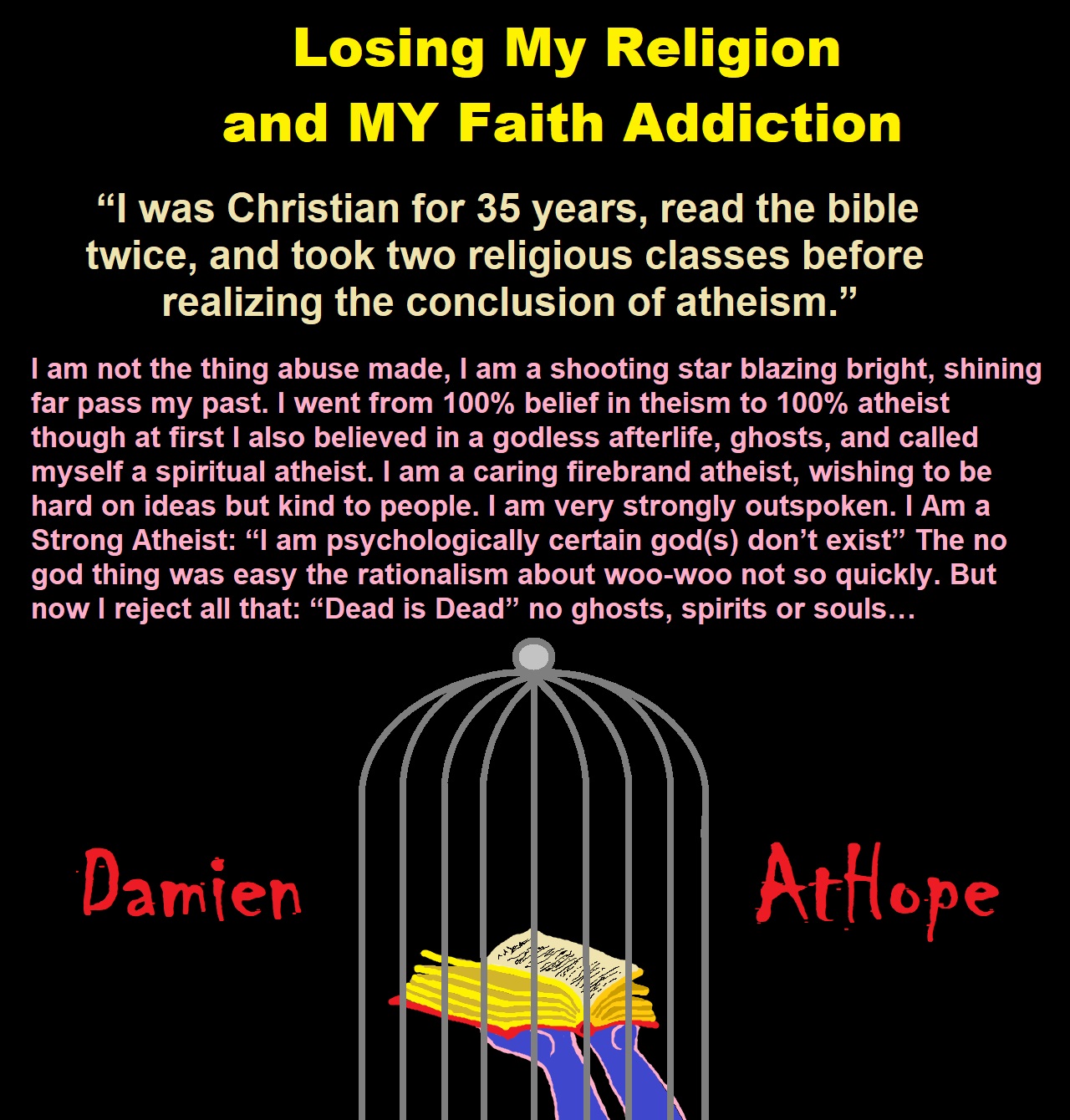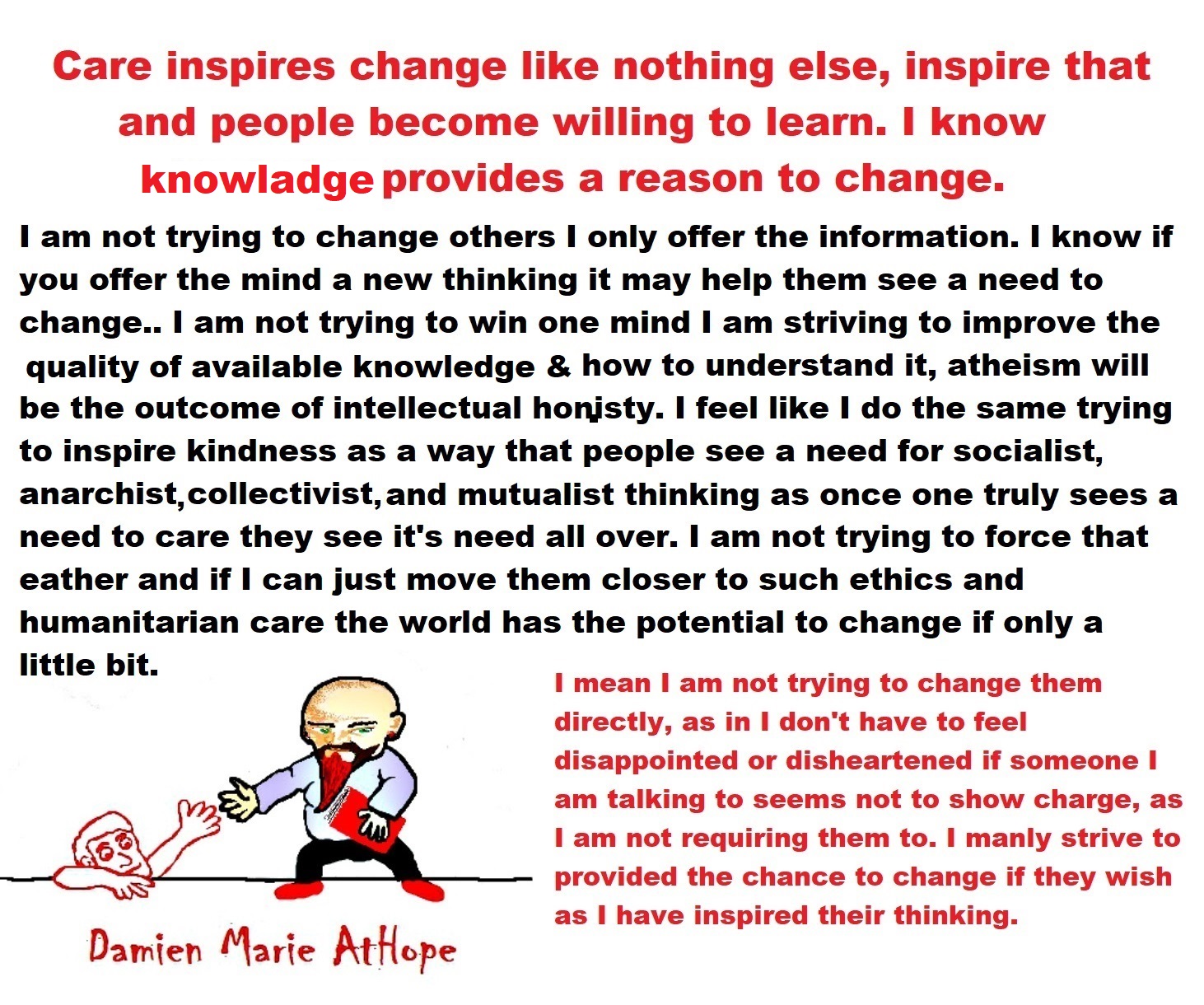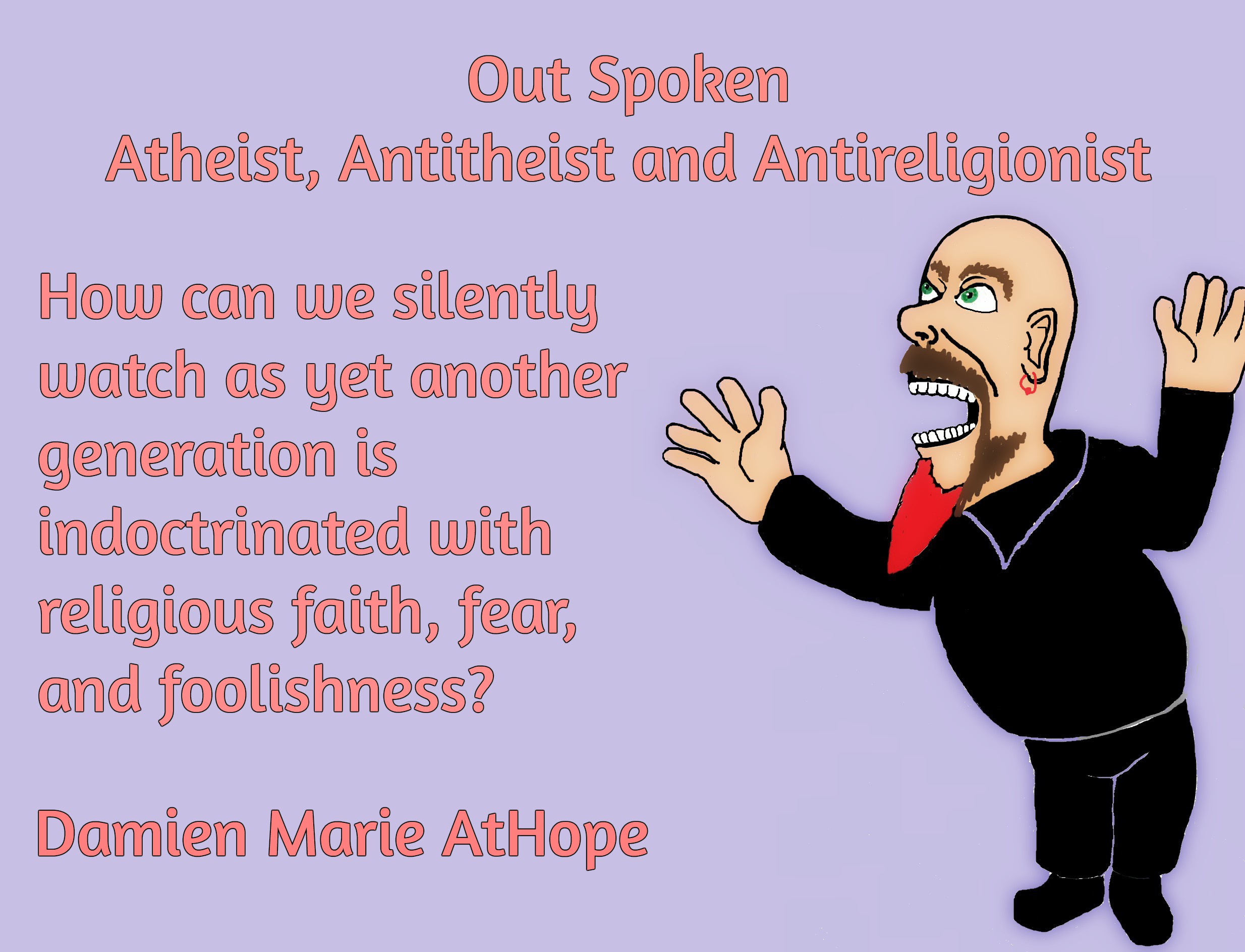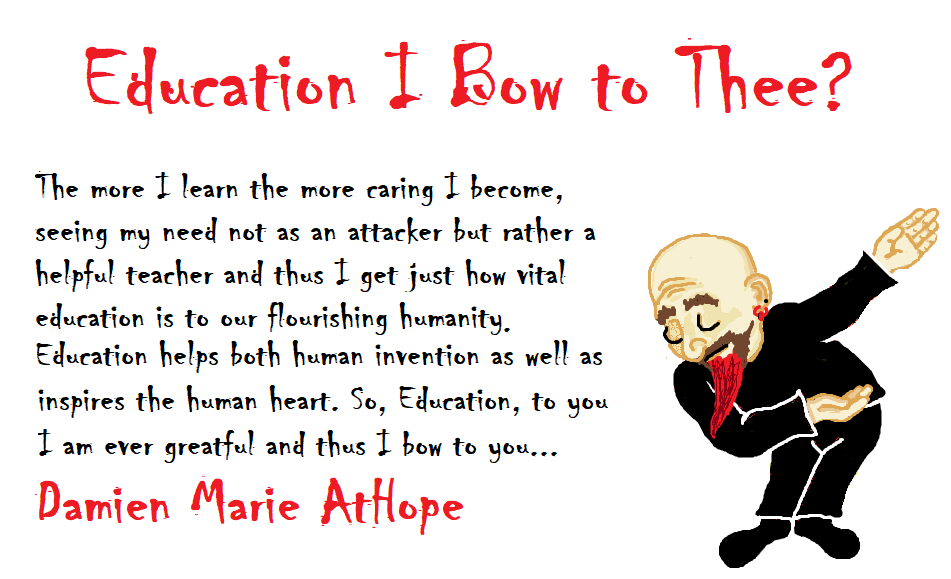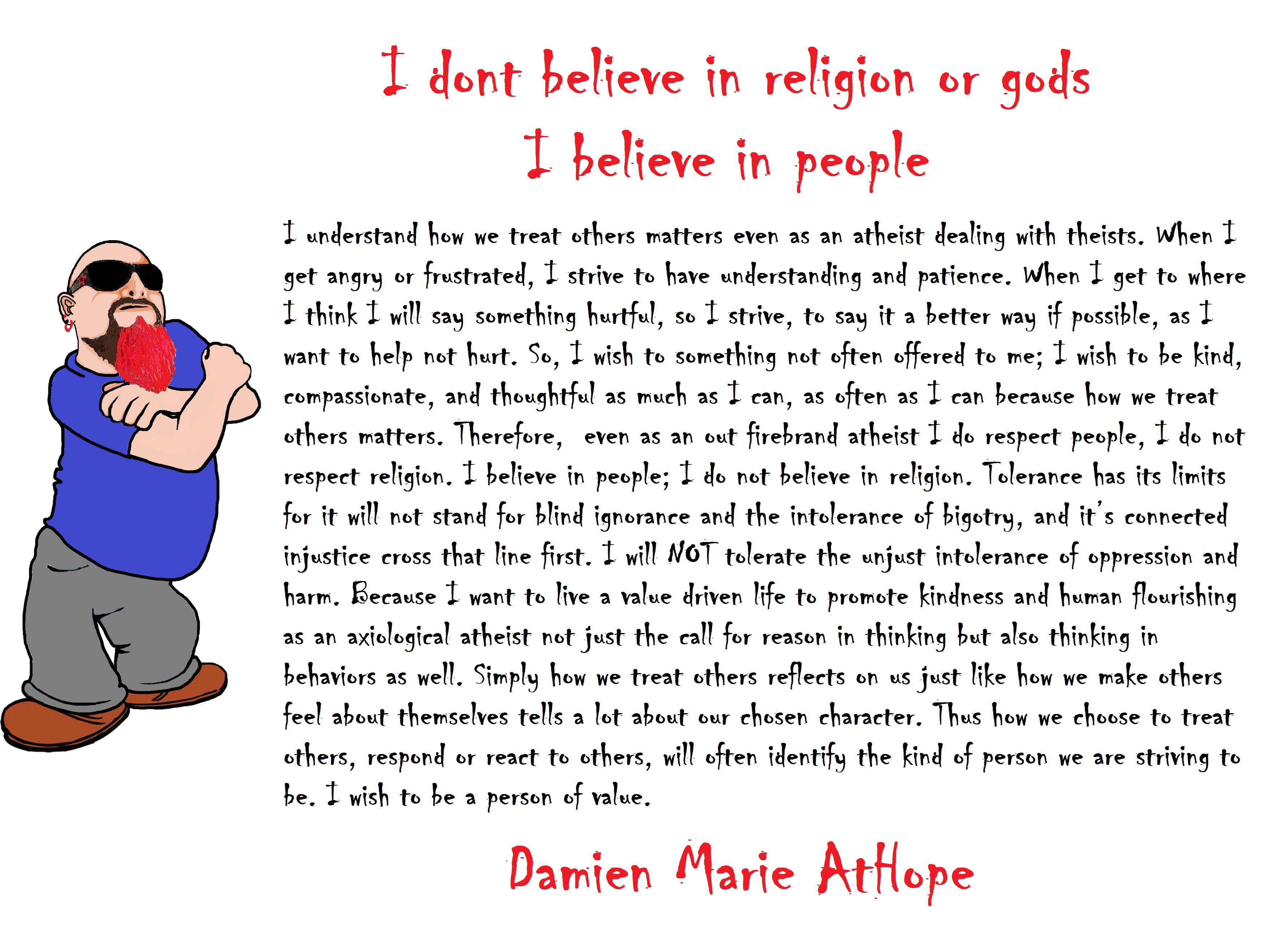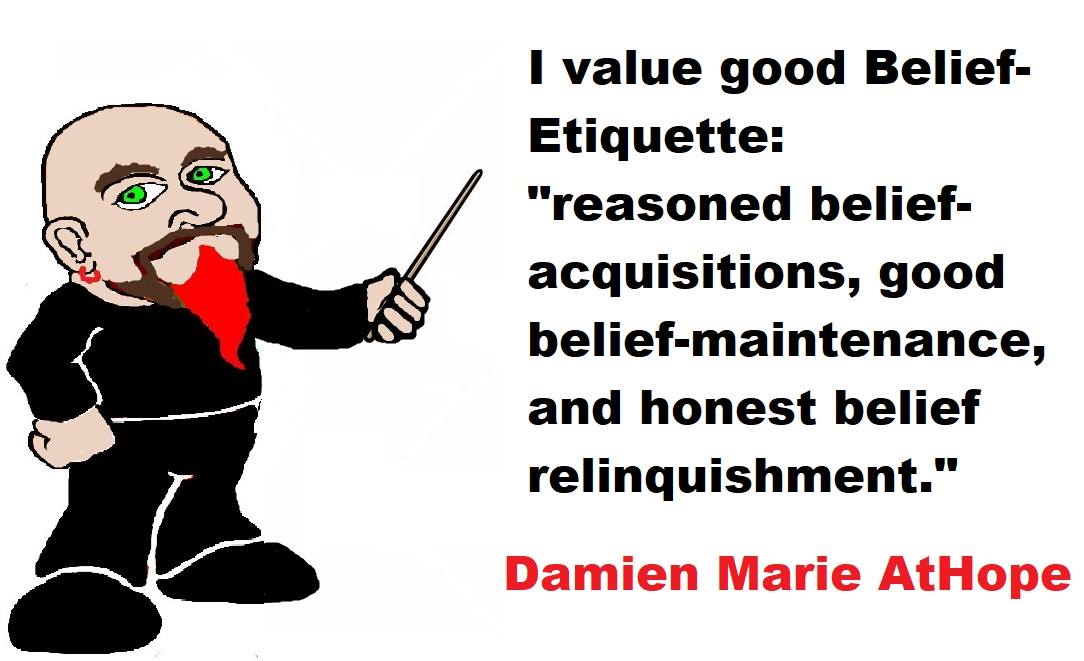
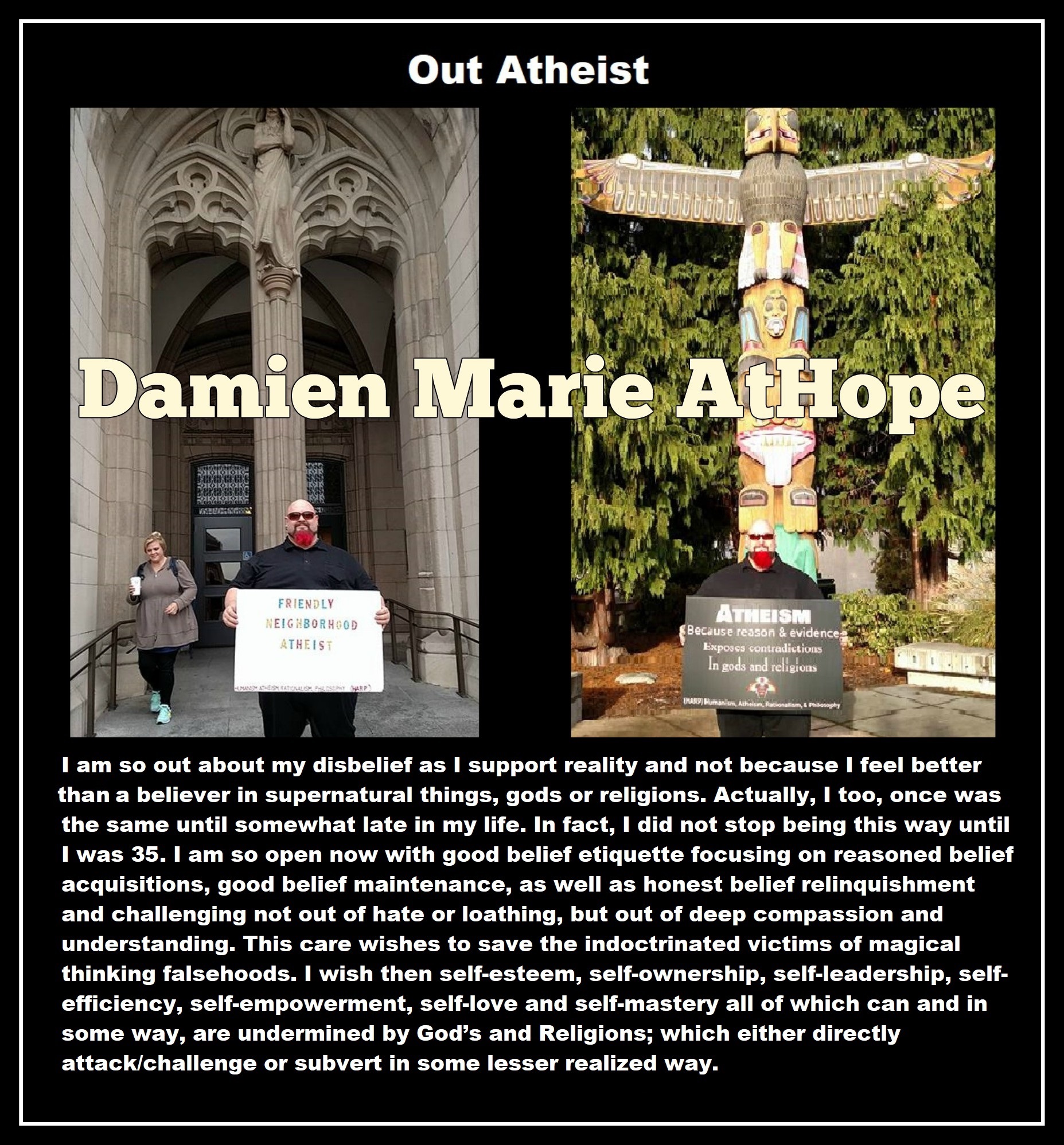

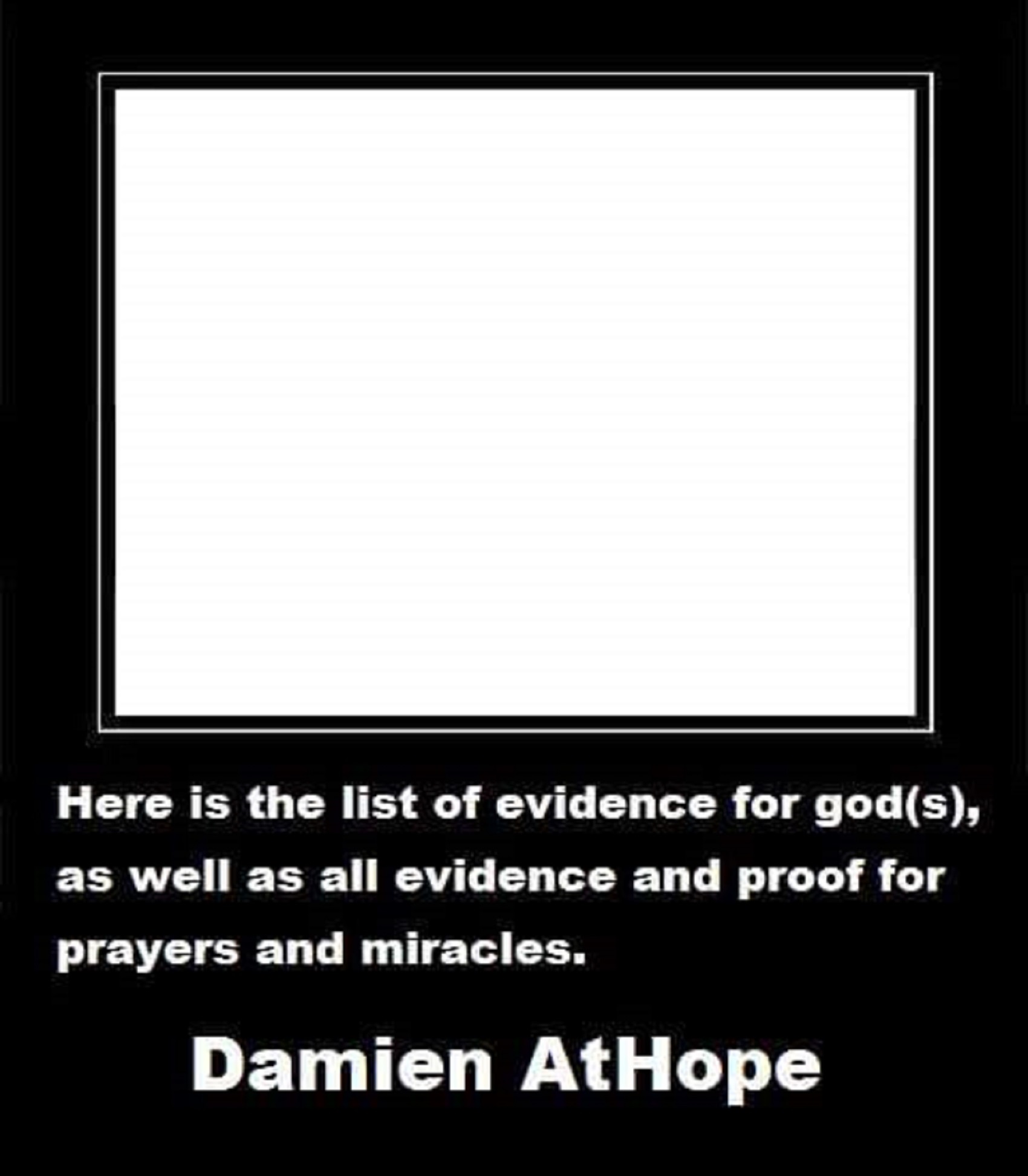
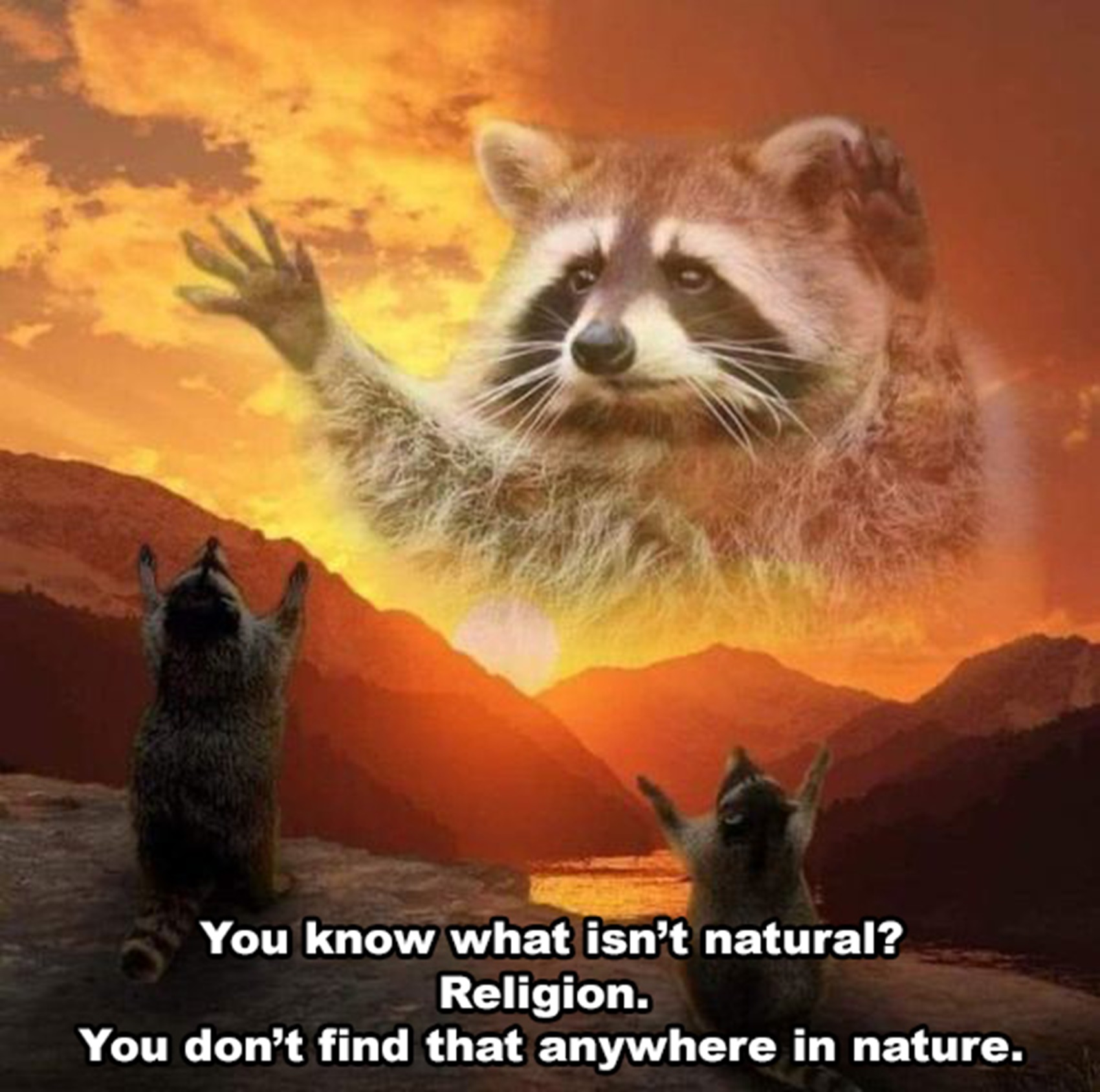
My Life Unplugged: “Losing My Religion and Finding Myself”
I am an Out Atheist, Antitheist, and Antireligionist as a Valuized Ethical Duty.
How can we silently watch as yet another generation is indoctrinated with religious faith, fear, and foolishness? Religion and it’s god myths are like a spiritually transmitted disease of the mind. This infection even once cured holds mental disruption which can linger on for a lifetime. What proof is “faith,” of anything religion claims by faith, as many people have different faith even in the same religion? When you start thinking your “out, atheism, antitheism or antireligionism is not vitally needed just remember all the millions of children being indoctrinated and need our help badly and who desperately need our help with the truth. Three things are common in all religions: “pseudo-science,” “pseudo-history,” and “pseudo-morality.” And my biggest thing of all is the widespread forced indoctrination of children, violating their free choice of what to not believe or believe, I hate forced hereditary religion.
- Yes, Your Male God is Ridiculous
- “Yes, you need to know about Animism to understand Religion”
- Why do people think Religion is much more than supernaturalism and superstitionism?
- What is the Afterlife in most religions?
- Let’s talk about Hell
- Hell claims debunk gods?
- Hell, Heaven and the Power of Imagination.
- Preposterous Idea of a Deity that Would Create Hell
- The claim of hell are ridiculous and immoral, not just false.
- Debunking both Positive (HEAVEN) and Negative (HELL) near death experiences.
- A Different Kind of Atheist: “Axiological, Methodological, Anarchist, Universal Ethicist, Realist, and Rationalist”
- An Archaeological/Anthropological Understanding of Religion Evolution
- Understanding Religion Evolution: Animism, Totemism, Shamanism, Paganism & Progressed organized religion
Ok, I am a kind of “Militant” Atheist
Well, I believe in others, or at least their ability to reason even if you don’t know how or are not paying attention currently. I can do deal with most people as I am often fighting for them even if they only feel I am against them and it usually is not that hard to do with a heart of compassion, as I care for the future of humanity and people have value. And, if people don’t listen or grasp logic, I try something else like reasoning. If they will not listen or grasp reasoning, I will try just getting them to think, maybe on something they can agree or they do understand trying to work them back to the rationalism they are not getting or are avoiding. Then, if I can get them to reason, I build that up to logic. If they don’t seem to get them to thinking or are trying to avoid I can draw them back to feelings, maybe on something they can agree or they do understand trying to work them back to thinking, then reasoning, and then finally back to logic with which they are not getting or are avoiding. In a general way, all reality, in a philosophic sense, is an emergent property of reason, and knowing how reason accrues does not remove its warrant. Feelings are experienced then perceived, leading to thinking, right thinking is reason, right reason is logic, right logic is mathematics, right mathematics is physics and from there all science.
Here are some of my relevant blogs:
- My Strongest Explicit Atheism “positive” / “strong” / “hard” atheists similar to Antitheist Atheism.
- “Damien, you are a strong atheist. I am wondering do you see yourself as better than theists?”
- As a rationalist I strongly stand up for reality
- Trying to Help Promote Knowledge: Philosophy and Science.
- My Methodological Rationalism: investigate (ontology), expose (epistemology) and judge (axiology)
- Methodological Rationalism (Ontology, Epistemology, & Axiology) and Skepticism
- My Methodological Skepticism Style
- Skepticism and or Rationalism Leads to Humanism and Atheism?
- When would skepticism NOT be reasonable?
- Extreme Skepticism: Solipsism?
- Pragmatic Ethical/Axiology Driven Assumptions, Overcome the Weight of Solipsism Doubt
- Objective and Subjective Logic?
- What’s the beginning of knowledge?
- Hammer of Truth: Yes, you too, have lots of beliefs…
- Truth Navigation and the fallacy of Fideism “faith-ism”
I am a caring firebrand atheist, wishing to be hard on ideas but kind to people.
My life; the good, the bad, and the ugly on the road to the Mental Freedom of Atheism
I Believe Archaeology, not Myths & Why Not, as the Religious Myths Already Violate Reason!
Archaeological, Scientific, & Philosophic evidence shows the god myth is man-made nonsense.
I am not the thing abuse made, I am a shooting star blazing bright, shining far pass my past.
Psychological certainty and Epistemic certainty?
god Claims are a Non-Reality Commodity
Vague Theism or god Somethingism: don’t believe in any particular god, but still, believe something.
“Vague Theism or god Somethingism generally involves unjustified false ideas involving a rather unspecified belief in some higher force/being they may term “god something”
“Damien sir, I am in a dilemma, can you help me???? I don’t believe in any particular god, but I believe in the god, i believe everything exists in this whole universe is part of god, am i an atheist????? each & everything made out of some mass & energy……” – Challenger
My response, you are a pantheist, a doctrine that identifies God with the universe or regards the universe as a manifestation of god(s).
“Damien, as the conservation theory explains that the total mass & energy is constant, & we are made from these mass & energy, why we are not part of the god???” – Challenger
My response, to me to call a thing god is to say it’s a superpower with a mind or intelligent expressed will. I don’t see anything like that in nature.
“Damien, sorry sir, but to me, it’s the entire mass & energy of the cosmos, which runs on some simple some physical rule……” – Challenger
My response, then it’s not a god.
“Damien, why sir????” – Challenger
My response, it’s like me calling love the expressed emotion god because all humans and most animals have this. But this is a logical fallacy of categorical error. A category mistake (or category error) is a logical fallacy that occurs when a speaker (knowingly or not) confuses the properties of the whole with the properties of a part. It contains the fallacy of composition (assuming the whole has the properties of the part) and the fallacy of division (assuming the part has the properties of the whole).
“Damien, i believe everything i can touch, see or feel, are part of god, even my toilet also is part of my god…… that’s why i never go to the temple (by the certificate i’m a hindu), or any kind of religious place…. my work is my religion…. & god (as I believe) never failed me….. i always get result as i worked…” – Challenger
My response, everything in the real world can fail and does so often. You sound like you have made your claim of god above failure. However, if there is no standard to fail by then there is also no standard for success. So, either your titled god does nothing or to you it does everything but then your label of god actually ends up meaning nothing….
My Atheism: “Axiological Atheism”
Yes, I was a undoubting Christian until the age of 35 years old, while in my second religious studies classes and so you know I have read the entire bible twice before I ever took the two college classes on religion and the bible before realizing I was an atheist; I was a very superstitious supernaturalist as well as a strong theist not even once did I think to doubt or even question. I am sad to say I was not much of a rationalist now that is my driving force. Now, I question everything and think through almost everything.
I lost my religion and faith addiction in 2006 after going to college. However, I don’t know if I should be called a just an atheist as this is too limited to define my disbelief. Thus, I am best described as an Axiological atheist: (Ethical/Value theory Reasoned and Moral Argument driven) Atheism, Anti-theism, Anti-religionism, and Secular Humanism I also value Ignosticism or igtheism.
Turning Atheist?
- Horned female shamans and Pre-satanism Devil/horned-god Worship? at least 10,000 years ago
- Are All Religions That Existed Before Christianity From the Devil?
- Devil, Satan, Lucifer, and the Serpent? Guess What They are Not the Same.
- Could the Phallus Phenomena (A Bull Horn) and the Shamanism Phenomena beginning around 30,000 years ago
- Riches are personified (Matt 6:24)
- Sin is personified (Romans 5:21, 6:16)
- Death is personified (Revelation 6:8)
- Nation of Israel personified (Jeremiah 31:4, 18)
- Believers in Christ are personified (Ephesians 4:13, 1 Corinthians 12:27)
- The Holy Spirit is personified (John 16:13)
Satanism More or Less?
The King James Mistakes Lucifer as Satan
Horned female shamans and Pre-satanism Devil/horned-god Worship?
My blogs on the Bible, Judaism, and Christianity
- Sedentism and the Creation of goddesses around 12,000 years ago as well as male gods after 7,000 years ago.
- Progressed organized religion starts, an approximately 5,000-year-old belief system
- When was the beginning: TIMELINE OF CURRENT RELIGIONS? Around 4,000 years ago.
- What is early monotheism, are Atenism and Zoroastrianism totally monotheistic?
- Creationism (pseudoscience)
- Creationism is a Debunked Religious Conspiracy Theory.
- List of Creation Myths?
- Evolution is FACT in many ways!
- Is Evolution a Theory or a Fact? “It is both.”
- Technological Advances in Evolution
- Dating the BIBLE: naming names and telling times (written less than 3,000 years ago, provable to 2,200 years ago)
- Genetic studies on Jewish DNA is not 6,000 years old but has origin links to about 20,000 to 30,000 years ago?
- Everyone Killed in the Bible Flood? “Nephilim” (giants)?
- Bible Cosmology is Laughable
- Flat Earth Mania: a debunked religious theory, given new life in the post-truth world
- Attacking Biblical Statements for a “fixed” and “immovable” Earth
- No “dinosaurs and humans didn’t exist together just because some think they are in the bible itself”
- Is bible god ethical? & Would It Be Bad or Good if God Exists? (axiological “value theory” questions)
- Animistic, Totemistic, and Paganistic Superstition Origins of bible god and the bible’s Religion.
- Jews, Judaism, and the Origins of Some of its Ideas
- Jews enslaved in Egypt is Myth…..
- Sexism in Judaism (old Testament)
- Hey, Damien dude, I have a question for you regarding “the bible” Exodus.
- Evil bible god? YES OF COURSE
- Is god choiceless or standardless or removed from ethics?
- Axiological Atheism Morality Critique: of the bible god
- Your god concept is vile…
- Bible god repented of Evil?
- God the unethical father?
- David’s Punishment for Rape? God’s “Forgiveness and Baby Killing ” (2 Samuel 12:11-14)
- “hi, enemy of god” – Challenger
- Christian Hate Groups?
- God Originated Mortality?
- Faith and the Three Stooges: bhagavad-gita, bible & quran
- So the 10 commandments isn’t anything to go by either right?
- Interview with Jeff Tadlock (Stairway To Reason)
- Horned female shamans and Pre-satanism Devil/horned-god Worship? at least 10,000 years ago
- 9,000-8,500 year old Female shaman Bad Dürrenberg Germany
- Satanism More or Less
- The Devil?
- Devil, Satan, Lucifer, and the Serpent? Guess What They are Not the Same.
- Are All Religions That Existed Before Christianity From the Devil?
- The King James Mistakes Lucifer as Satan
- Accurate Account on how did Christianity Began?
- Bill Zuersher and his book “Seeing through Christianity: A Critique of Beliefs and Evidence”
- Archaeology Disproves the Bible
- I Believe Archaeology, not Myths & Why Not, as the Religious Myths Already Violate Reason!
- Did a Volcano Inspire the bible god?
- Bible Battle, Just More, Bible Babble
- The Jericho Conquest lie?
- Traces of Totemism In Judaism
- Canaanites and Israelites?
- Accurate Account on how did Christianity Began?
- Christian 35 years, read the bible twice, and took two religious classes before the conclusion of atheism.
- Compare and Contrast (religious and non-religious)
- Losing My Religion and MY Faith Addiction
- A Christian supporter, Damien Marie AtHope is winning fans but dredging up Old Adversaries?
- christofascism (christian and fascism) as well as religiofascism (religion and fascism)
- What makes Atheism a better way of thinking in life?
- Damien, I’m open AND a Christian!
- Incapable of making a decision on if there is or not a god?
- It’s Not the Deity You See as Possible But How Many You Reject
- Christians Don’t Believe the Entire Bible
- Muslim Terrorists and Christian Terrorists?
- True Christian® ???
- What is bible and Who is jesus???
- Rethinking Jesus?
- Jesus Christ Wanted for producing the hate and fear literature, the so-called “Holy Bible?”
- The Bible shows a racist character of jESUS who was not god but was a bigot “if real”
- jESUS (a fake story) explained as a real bigot but not a gOD
- The bible god Myth is Not True but The Prejudice is.
- Paulism vs Jesus
- Please explain why anyone would follow jesus’ teachings?
- Christianity Believers: Consider This
- Let’s talk about Christianity.
- Misinformed christian
- Dealing with Presuppositionalism, a school of Christian apologetics (Fascistic Fideism or “faith-ism”)
- Bible Defender?
- How Caring and Unconditionally Loving is the bible god Character?
- The So-Called Love of bible god is Actually a Pseudo Love.
- Sexism in Christianity (New Testament)
- New Testament: bigotry, cruelty, sexism, slavery, racism, etc.
- Slavery, Racism, Religion and the Confederate Flag
- New Testament on Slavery
- Rape, Sexism, and Religion?
- Was the Value of Ancient Women Different?
- Sexism in the BIBLE: chapter and verse!
- Sexism in Catholicism
- Sexism in Protestantism
- Sexism in Mormonism
- Sexism in Jehovah Witness
- Feminist atheists as far back as the 1800s?
- Anti-theism makes no logical sense?
- Out of Africa: “the evolution of religion seems tied to the movement of people”
- The Evolution of Religion and Removing the Rationale of Faith
- Explaining My thoughts on the Evolution of Religion
- Speech on the Evolution of Religion & Religious Sexism
- Understanding Religion Evolution: Animism, Totemism, Shamanism, Paganism & Progressed organized religion
- Addressing a Theistic Philosopher with Fallacious Thinking
- Caring firebrand atheism vs. Christian nationalism and dominionism
- Caring Firebrand Axiological Atheist, Antitheist, and Antireligionist as a Valuized Ethical Duty.
- Firebrand Atheist Dealing with Christian, Threat Prayers
- “Damien, you are a strong atheist. I am wondering do you see yourself as better than theists?”
- Warning Churchs, I am coming to Indiana as a firebrand atheist to do activism.
- Thoughts on Death: Christian turned Atheist
- Let’s talk about Hell
- Hell claims debunk LOVING gods?
- The claim of hell are ridiculous and immoral, not just false.
- Debunking both Positive (HEAVEN) and Negative (HELL) near death experiences.
- Near Death Experiences is Brain Activity, not Supernatural
- Hell is not a source of science, Satan says
- Threats of Hell are Humanistically Wrong
- Hell, Heaven and the Power of Imagination.
- Preposterous Idea of a Deity that Would Create Hell
- Scary Beasts In Heaven?
- Value-blindness Gives Rise to Sociopathic evil.
- Axiological Ethics not Pseudo Morality
- Yes, Your Male God is Ridiculous
- Single God Religions (Monotheism) = Man-o-theism started around 4,000 years ago?
- Kultepe? An archaeological site with a 4,000 years old women’s rights document.
- Religion is Conspiracy Theories of Reality, Not Worth Believing In
- I Hate Religion Just as I Hate all Pseudoscience
- Sumerian Creator Being was a Female, not Male possibly around 6,000 years ago or more
- The Disproof Atheism Society: EMPIRICAL, CONCEPTUAL, and DISPROOFS of gOD
- I Blaspheme the Unreal Unholy Bible Spirit called gOD
- When you say “GOD,” what do you mean by god?
- Who knows what a “god-claim” really is?
- Fibonacci sequence as scientific evidence of a creator?
- Sorry You Have No Evidence
- god Claims are a Non-Reality Commodity
- What do you mean by god Evidence?
- You will always fail to prove a specific god?
- Arguments over the term god?
- Vague Theism or god Somethingism: just say NO
- Faith is Not Evidence of Reality
- What is a gOD Challenge
- Addressing “ATHEISM”, reasons for it and its possible types/styles
- Using Ontology to Attack Theistic Errors
- You say you believe in a possibility of your favored god-claim?
- Why are all gods unjustified?
- What is a god? Just a Empty Label.
- gOD Believer, Pease Think Critically
- The God Fallacy
- Religion and Science are Completely Different Epistemologies
- Doubt god(s)? No, I stopped believing Fairytales.
- Damien, is it possible, there’s a God you haven’t considered?
- Archaeological, Scientific, & Philosophic evidence shows the god myth is man-made nonsense.
- I am an Axiological Atheist, with a Rationalist Persuasion, who Supports Anarcho-Humanism
- Fideism/Faith-ism (“faith-drunk-thinkers”)
- Truth Navigation and the fallacy of Fideism “faith-ism”
- Interview with the editor for Canadian Atheist
- Interview EP (55) Mark Lee secular humanist agnostic atheist activist antitheist from Kelowna, British Columbia (Canada)
- Guest post: Atheism’s Conclusion by Rational Thinking” by Marquis Amon
- Atheophobia and a Challenger to the Term
- Talking Atheism: Arael Avinu of Fully DE/converted and Caring Firebrand Atheist, Damien Marie AtHope
- Rationalism and the Enlightenment
- Challenging Agnosticism Assumptions
- The Fun of Harassing Street Preachers. Counter-Protesting is Fun.
- Religion harm and a way to stop it’s Rights Violations?
- Turning a Theist Attack into a Chance for Their New Learning: “an open dialog”
- Freedom of Religion, not Coercive Hereditary Religion
- Self-ownership, Human Rights, and Societal Liberty or Freedoms
- Self-ownership/Body-ownership: Sexual Consent, Abortion, Genital Mutilation, Prostitution, Drugs, and the Right to Die
- “No gODs, No Masters”
- Screw All Religions and Their Toxic lies, they are all fraud
- A Rational Mind Values Humanity and Rejects Religion and Gods
- CRITICAL THINKING: Discernment Detachment Delineation
- No Worship No Bullshit
- The Beginning origins of Atheistic Doubt at least by around 2,500 years ago.
- Confusions in Atheism and Humanism
- How Do I Gain a Morality Persuasion or Make a Change to it?
- Variations of Human Interaction: ethical, unethical, good, bad, or evil?
- THE SOUL OF LIBERTY: “The Universal Ethic of Freedom and Human Rights” By Fred E. Foldvary
- “My correspondence with a believer in souls”
- Energy = god, spirits, and/or afterlife? NO, and such thinking is misplaced animism magical thinking nonsense.
- Damien, What’s Worse Christians or Spiritual Non-religious?
- Religion and Poverty?
- Prosperity theology: donating money increases wealth?
- As an atheist what do you believe happens when you die?
- Grief While Having Atheistic Disbelief
- Religious OCD Subtype?
- Religious Trauma Syndrome?
- “You” are religious “You” are in a cult!
- Addressing Destructive Cults?
- Jews, Judaism, and the Origins of Some of its Ideas
- Traces of Totemism In Judaism
- Canaanites and Israelites?
- Jews enslaved in Egypt is Myth…..
- Hey, Damien dude, I have a question for you regarding “the bible” Exodus.
- Animistic, Totemistic, and Paganistic Superstition Origins of bible god and the bible’s Religion.
- New Testament on Slavery
- Archaeology Disproves the Bible
- Bible Morality and a Genocidal god of Watery Death?
- Sexism in the BIBLE: chapter and verse!
- Let’s talk about Christianity.
This is like blaming Frankenstein’s monster for Mary Shelley writing Frankenstein. He had nothing whatsoever to do with the bible, even according to the traditional Christian account.
“The NT was not written by the time he allegedly died, so you can’t be referring to the NT. But just the Tanakh is not what people usually mean when they say “holy bible,” but rather Tanakh + NT, so this meme is inaccurate regardless of whether the historical Jesus supported the Tanakh. – Challenger
My response, And the Tanakh is rich with hate and fear literature, so yes he is indeed responsible for that so try again.
“You’re just repeating yourself now. I already specified why this meme is inaccurate. If you want to keep it up, that’s on your intellectual integrity to share false information, but I would delete it because I have intellectual integrity. And anyway, you didn’t say “WANTED: for SUPPORTING the Holy Bible,” but rather for “producing” it, which is just ridiculous. He did not write any of it either. This meme is just all kinds of falseness wrapped in a bundle. I see you criticize theists all the time for not being truthful. Do you not hold yourself to the same standard?” – Challenger
My response, see you still are the one inaccurate as the bible contains the old testament and jesus in only found in the new testament so your argument is beyond odd to say one cannot refer to the new testament the only place we would even know about the jesus character and in which it is claimed to have not stayed dead and thus returned to the god-state which was then claimed to continue to influence the bible so yes he is responsible by the bible itself. So, I need to hear a better argument from you than jesus id not responsible for the bible.
“Jesus could not have supported or “produced” the NT because every shred of it was written AFTER he allegedly died. That should be obvious, but your typo-filled run-on sentences do not establish the contrary. For someone who doesn’t think Jesus is god, this is just a dumb argument to suppose that he is in order to criticize him. It’s like giving something with one hand and taking it away with the other. Anyhow, you are not coming off as very intelligent here. Honestly, quite the contrary. Is it too much to ask that if you are going to produce antitheist memes, that you don’t inject the belief in god into them first (a very strange stance to take, but then you defend it)? You are a muddled mess, and it’s like you’ve never even pondered what it is you’re trying to accomplish on a pragmatic level.” – Challenger
My response, so no good argument to support your claim that the bible is not influenced by god/jesus?
Produce a meme against the belief in god, but then inject the belief in god into it, so that it’s only construed to be accurate if god exists? That is one of the dumbest things I’ve ever heard of in the atheist community, FYI. Yes, god and Jesus don’t exist. No need to have fictional characters produce or support or influence anything. If that’s not enough, then I have nothing more to offer.” – Challenger
My response, don’t you know you need more than empty claims that don’t prove your point that the general believers do not think the bible is not inspired by god/jesus?
“My estimation of your IQ just dropped by 35 points. How is it an empty claim if you also don’t believe god exists. Are you going to tell me that I need to somehow argue to you that god does not exist for this post to be inaccurate?” – Challenger
My response, this is one of the oddest things I have heard that someone would try to say that the general believers do not think the bible is not inspired by god/jesus. The meme is to address what bible believers believe its a visual added critique as one who talks of IQ would seem to be likely to know but here you are, asking how, “is it an empty claim if you also don’t believe god exists” trying to act as if you don’t get what is being offered in the meme. Rather it makes you mad because of some other reason than actually claiming Jesus believers don’t think he influenced most if not all of the bible. To jesus-believers, jesus is god and influenced almost everything in the bible. I have a BA in Psychology with some sociology/addictions therapy as well as an Autodidact in Science, Archeology, Anthropology, and Philosophy.
“That is correct in terms of what Christians believe. They are, furthermore, comfortably ensconced in those beliefs in Jesus and god and the bible. The point of an atheist producing a meme against Christianity is to influence believers to not believe in Christianity as much, or otherwise, it’s a circle-jerk between atheists, if atheists are the only intended audience. But an atheist producing a meme which takes fundamental Christian tenets to be pre-suppositionally true is not going to be effective because it does not push Christians to go outside their comfort zones. Before the meme, they thought Jesus is god and god exists and the bible is true. And the meme MAKES this same argument and so after the meme, they are going to think Jesus is god and god exists and the bible is true. This is basic pragmatics, which obviously Damien has not studied via his auto-didacticism. So, yes, it is just a big atheist circle-jerk. I guess it’s too much to ask for an atheist to create and share memes which don’t take fundamental Christian beliefs as accurate. I mean, what would the world have to come to for that obvious point to have to be implemented?” – Challenger
My response, it was to point out two truths you are seemingly not wishing to address, like how it’s a wanted poster so it’s pointing out jesus is missing and the intellectual joke in that if you miss it is that the jesus character is not coming back and the other if you missed it was to attach the remainder of the bible’s hate and fear and connecting t to the jesus character. And as we stand is you tried to do a red herring logical fallacy trying to turn it to my education, then your ad hominem attack just for fun I guess and yet with all your believed superior to me talk are inferior in an argument where it counts my friend. I must wonder if you now see you were wrong as still have not addressed your continual weak argument that is not yet supported as you still don’t have support that jesus/god is not responsible for inspiring the bible.
The Evolution of Religion and Removing the Rationale of Faith
Understanding Religion Evolution
Promoting Religion as Real is Harmful?
Sometimes, when you look at things, things which seem hidden at first, only come clearer into view later upon reselection or additional information. So, in one’s earnest search for truth one’s support is expressed not as a onetime event and more akin to a life’s journey to know what is true. I am very anti-religious, opposing anything even like religion, including atheist church. but that’s just me. Others have the right to do atheism their way. I am Not just an Atheist, I am a proud anti-religionist. I can sum up what I do not like about religion in one idea; as a group, religions are “Conspiracy Theories of Reality.” These reality conspiracies are usually filled with Pseudo-science and Pseudo-history, often along with Pseudo-morality and other harmful aspects and not just ancient mythology to be marveled or laughed at. I regard all this as ridiculous. Promoting Religion as Real is Mentally Harmful to a Flourishing Humanity To me, promoting religion as real is too often promote a toxic mental substance that can divide a person from who they are shaming them for being human. In addition, religion is a toxic mental substance that can divide a person from real history, real science or real morality to pseudohistory, pseudoscience, and pseudo-morality. Moreover, religion is a toxic mental substance that can divide a person from rational thought, critical thinking, or logic. Likewise, religion is a toxic mental substance that can divide a person from justice, universal ethics, equality, and liberty. Yes, religion is a toxic mental substance that can divide a person from loved ones, and religion is a toxic mental substance that can divide a person from humanity. Therefore, to me, promoting religion as real is too often promote a toxic mental substance that should be rejected as not only false but harmful as well even if you believe it has some redeeming quality. To me, promoting religion as real is mentally harmful to a flourishing humanity. Religion may have once seemed great when all you had or needed was to believe. Science now seems great when we have facts and need to actually know.
The art of know yourself, love yourself, be yourself?
The art of knowing yourself: this involves getting to the place of knowing oneself they, which they must first understand why knowing oneself is important, as well as how to comprehend they don’t already know themselves or that most people don’t know themselves even if they think they do.
The art of loving yourself: this involves getting to the place of knowing oneself they, which they must first understand why knowing one’s self is important, as well as how to comprehend they don’t already know them self or that most people don’t know themselves even if they think they do. First one must think about what love looks like wouldn’t it be a growth-producing or would it build self-enlightenment and self-truth? Do you feel I or anyone can define your truth (about who you are)? If someone defined truth for you would you really own it? Wouldn’t it make more sense instead for me to broaden your ability to see the question? First, would you think a question like this of such a personal relevance has right answers? To start thinking on what love is would we look at are fallible behavior or some philosophical definition? If we look at are relations with others could we be convicted of loving? If we wish for a philosophical definition of love what realities does it hold in our real lives? Is love a feeling or a behavior? If we look at love as feeling what emotional substance does it stem from? If we look at love as behavior is it fixed in the behaviors of others?
The art of being yourself: this involves getting to the place of being oneself, which they must first understand why knowing one’s self is important, as well as how to comprehend they don’t already know them self or that most people don’t know themselves even if they think they do. Be yourself; everyone else is already taken. Being yourself is celebrating you, as an individual – learning to express yourself and be happy with who you are. Define yourself by yourself: You can’t be yourself if you don’t know, understand, and accept yourself first. It should be your primary goal to find this out. Be YOU authentically: don’t put too much care about how other people perceive you including your parents or family. The fact is, it really doesn’t matter in the long run and lf love must be bought bartered for or molded to be received, is it a love worth having. It’s impossible to be yourself when you’re caught up in wondering “Do they like or accept me?” To be yourself, you’ve got to let go of these concerns and just let your behavior flow, with only your consideration of others as a lens to reference with not own as your own. Don’t Hide: everyone is unique has quirks as well as imperfections; we are all at different stages in life. Be honest with yourself, but don’t be too hard on yourself; apply this philosophy to others, as well. There is a difference between being critical and being honest; learn to watch the way you say things to yourself and others. Own who you are: if you’re always working to be someone you’re not, you’ll never be a happy person. Be yourself and show the world you’re proud of the way you are! Nobody knows you better than you and that’s how it should be. You deserve to be your own best friend, so start trying to figure out how you can do that. If you had to hang out with yourself for a day, what is the most fun type of person you could be, while still being yourself? What is the best version of you? Believe in this idea and use that as your starting point. And how we use this thinking to change how we interact with others is, Knowing society, Loving the Humanity of Society, and Being the Humanity in Society.
A Rational Mind Values Humanity and Rejects Religion and Gods
A truly rational mind sees the need for humanity, as they too live in the world and see themselves as they actually are an alone body in the world seeking comfort and safety. Thus, see the value of everyone around then as they too are the same and therefore rationally as well a humanistically we should work for this humanity we are part of and can either dwell in or help its flourishing as we are all in the hands of each other. You are Free to think as you like but REALITY is unchanged. While you personally may react, or think differently about our shared reality (the natural world devoid of magic anything), We can play with how we use it but there is still only one communal reality (a natural non-supernatural one), which we all share like it or not and you can’t justifiably claim there is a different reality. This is valid as the only one of warrant is the non-mystical natural world around us all, existing in or caused by nature; not made or caused by superstitions like gods or other monsters to many sill fear irrationally.
Do beliefs need justification?
Yes, it all requires a justification and if you think otherwise you should explain why but then you are still trying to employ a justification to challenge justification. So, I still say yes it all needs a justification and I know everything is reducible to feeling the substation of existence. I feel my body and thus I can start my justificationism standard right there and then build all logic inferences from that justified point and I don’t know a more core presupposition to start from. A presupposition is a core thinking stream that like how a tree of beliefs always has a set of assumed sets of presuppositions or a presupposition is relatively a thing/thinking assumed beforehand at the beginning of a line of thinking point, belief projection, argument or course of action. And that, as well as everything, needs justification to be concluded as reasonable. Sure, you can believe all kinds of things with no justification at all but we can’t claim them as true, nor wish others to actually agree unless something is somehow and or in some way justified. When is something true that has no justification? If you still think so then offer an example, you know a justification. Sure, there can be many things that may be true but actually receiving rational agreement that they are intact true needs justification.
No god Claims have Justification, Challenge?
“Damien, (responding to me saying no god claims have justification) there are problems thinking everything you believe needs a justification.” – Challenger
My response, so, are you saying something can be claimed as real but have no warrant to justify why one should agree or even entertain it?
“The idea that Induction is reliable can be claimed and seems like an important assumption, but arguments for it are fallacious. There are similar issues with thinking an external world exists.” – Challenger
My response, ok, and how do we discern any of it, if nothing has a need for justification? Because to me, I see you’re saying something is fallacious as asserting a justification stance and thus, is similar to what I think, which is valid, that there is a rationalistic need for justification. You are telling me I am wrong and that needs a justification, just as me showing your thinking wrong took a justification. If not then tell me how I am wrong utilizing no justification at all. So, try to prove me wrong because even if you do you will have provided a justification so then further proving my assertion of the need for justification.
“You are missing part of the conversation. Can you prove every belief needs a justification? Let’s say every belief needs a justification. Then you have to argue for every premise of every argument. That requires infinite arguments. What exactly is your argument that all beliefs require a justification? I am not challenging the importance of justification. I am challenging the idea that every belief has to have a justification. The example above is induction. Hume showed why arguments for induction will be fallacious. I did not just make the claim. Go ahead and prove induction is reliable if you can. It would revolutionize philosophy. In response to >>sure you can believe all kinds of things with no justification at all but we can’t claim them as true not wish others to actually agree unless something is somehow and or in some way justified. I already said every challenged claim in a debate has to be argued for. Every claim has a burden of proof anyway. Most beliefs that do not require justification are things basically everyone already agrees with. But if you debate someone who rejects the existence of an external world or the reliability of induction, you can’t prove that they have to agree as far as I can tell. In response to >>When is something true that has no justification? Lots of things are true and we don’t know they are true. To claim to know something is true is another issue. But maybe we know induction is reliable. Maybe we know there is an external world. If so, it’s not clear how we know those things. I already mentioned induction above and you never talked about it.” – Challenger
My response, “Sure, there can be many things that may be true but actually receiving rational agreement that they are intact true needs justification.”
“Right, I think we might have talked past one another a bit. I don’t expect agreement without a good argument.” – Challenger
My response, so you, like me want a justification?
Of course, it is a very important thing to me in general.” – Challenger
“Damien, you are evil.” – Attacker
My response, I am only evil in your pseudo-morality.
“Good luck bro lol Hell is waiting.” – Attacker
My response, tell me what kind of thinking is it that has such joy, at the thought of others suffering? I will tell you not a humanistic one nor an ethical one, more proof of your pseudo-morality is affecting your honest care as a human and still you don’t see it.
Axiological Morality Critique of Pseudo-Morality/Pseudomorality?
Religions Promote Pseudo-Morality
Without Nonsense, Religion Dies!!!
I am against ALL Pseudoscience, Pseudohistory, and Pseudomorality. And all of these should openly be debunked, when and where possible. Of course, not forgetting how they are all highly represented in religion. All three are often found in religion to the point that if they were removed, their loss would likely end religion as we know it. I don’t have to respect ideas. People get confused ideas are not alive nor do they have beingness, Ideas don’t have rights nor the right to even exist only people have such a right. Ideas don’t have dignity nor can they feel violation only people if you attack them personally. Ideas don’t deserve any special anything they have no feelings and cannot be shamed they are open to the most brutal merciless attack and challenge without any protection and deserve none nor will I give them any if they are found wanting in evidence or reason. I will never respect Ideas if they are devoid of merit I only respect people.
I Hear Theists?
I hear what theists say and what I hear is that they make assertions with no justification discernable of or in reality just some book and your evidence lacking faith. I wish you were open to see but I know you have a wish to believe. I, however, wish to welcome reality as it is devoid of magic which all religions and gods thinkers believe. I want to be mentally free from misinformed ancient myths and free the minds of those confused in the realm of myths and the antihumanism views that they often attach to. So, I do have an agenda for human liberation from fears of the uninformed conception of reality. Saying that some features of reality are not fully known is not proof of god myth claims. II’s not like every time we lack knowledge, we can just claim magic and if we do we are not being intellectually honest to the appraisal of reality that is devoted of anything magic. Theists seem to have very odd attempts as logic, as they most often start with some evidence devoid god myth they favor most often the hereditary favorite of the family or culture that they were born into so a continuous blind acceptance generation after generation of force indicated faith in that which on clear instinctually honest appraisal not only should inspire doubt but full disbelief until valid and reliable justification is offered. Why are all gods unjustified? Well, anything you claim needs justification but no one has evidence of god claim attributes they are all unjustified. All god talk as if it is real acts as if one can claim magic is real by thinking it is so or by accepting someone’s claim of knowing the unjustifiably that they understand an unknowable, such as claims of gods being anything as no one has evidence to start such fact devoid things as all knowing (there is no evidence of an all-knowing anything). Or an all-powerful (there is no evidence of an all-powerful anything). Or the most ridiculous an all-loving (there is no evidence of an all-loving anything). But like all god claims, they are not just evidence lacking, the one claiming them has no justified reason to assume that they can even claim them as proof (it’s all the empty air of faith). Therefore, as the limit of all people, is to only be able to justify something from and that which corresponds to the real-world to be real and the last time I checked there is no magic of any kind in our real-world experiences. So, beyond the undefendable magical thinking not corresponding to the real-world how much more ridicules are some claimed supreme magical claimed being thus even more undefendable to the corresponding real-world, which the claimed god(s) thinking is a further and thus more extremely unjustified claim(s). What is this god you seem to think you have any justification to claim?
God: “antihumanism thinking”
God thinking is a superstitiously transmitted disease, that usually is accompanied with some kind of antihumanism thinking. Relatively all gods, in general, are said to have the will and power over humans. Likewise, such god claims often are attributed to be the ones who decide morality thus remove the true morality of nature in humans that actually assist us in morality. So, adding a god is to welcome antihumanism burdens, because god concepts are often an expression. This is especially so when any so-called god somethingism is said to make things like hells is an antihumanism thinking. A general humanism thinking to me is that everyone owns themselves, not some god and everyone is equal. To me, such humanism thinking to me requires a shunning of coercion force that removes a human’s rights or the subjugation of oppression and threats for things like requiring belief or demanding faith in some other unjustified abstraction from others. Therefore, humanism thinking is not open to being in such beliefs, position or situations that violate free expression of one’s human rights which are not just relinquished because some people believed right or their removal is at the whims of some claimed god (human rights removing/limiting/controlling = ANTIHUMANISM).
Evil bible god? YES OF COURSE
Humanism to me, summed up as, humans solving human problems through human means. Thus, humanism thinking involves striving to do good without gods, and not welcoming the human rights removing/limiting/controlling, even if the myths could somehow come to be true.
Variations of Human Interaction: ethical, unethical, good, bad, or evil?
Do you support Human Rights, Are you a Humanist?
How can one claim to be a humanist and somehow not feel compelled to question all beliefs that oppose human values? Simply the world we live in requires that we care, for if we don’t we still live there but can hardly be thought of as a humanistic supporter. Sometimes the greatest fight, in an unfair uncaring world, is not to let it change you for the worst. We should be our best and change the world instead. And not to let it stop us from wishing to be as fair and kind as we can. For the world is not only one we live in but one we help create. Let’s create a better world we can all be proud of together, one of freedom, equality, love, and care.
Variations of Human Interaction: ethical, unethical, good, bad, or evil?
How to Grow in Our Positive Outcomes:
“Gratitude, Empathy, and Kindness”
We can become a more quality person by actively being aware and developing a gratitude for life, which supports as well as grows our feelings of empathy, that then motivates the behavior of kindness.
If you are a religious believer, may I remind you that faith in the acquisition of knowledge is not a valid method worth believing in. Because, what proof is “faith”, of anything religion claims by faith, as many people have different faith even in the same religion?
- To Find Truth You Must First Look
- Archaeology Knowledge Challenge?
- The Evolution of Fire Sacralizing and/or Worship 1.5 million to 300,000 years ago and beyond?
- Stone Age Art: 500,000 – 233,000 Years Old
- Around 500,000 – 233,000 years ago, Oldest Anthropomorphic art (Pre-animism) is Related to Female
- 400,000 Years Old Sociocultural Evolution
- Pre-Animism: Portable Rock Art at least 300,000-year-old
- Homo Naledi and an Intentional Cemetery “Pre-Animism” dating to around 250,000 years ago?
- Did Neanderthals teach us “Primal Religion (Pre-Animism/Animism?)” 120,000 Years Ago?
- Animism: an approximately 100,000-year-old belief system?
- Rock crystal stone tools 75,000 Years Ago – (Spain) made by Neanderthals
- Stone Snake of South Africa: “first human worship” 70,000 years ago
- Similarities and differences in Animism and Totemism
- Did Neanderthals Help Inspire Totemism? Because there is Art Dating to Around 65,000 Years Ago in Spain?
- History of Drug Use with Religion or Sacred Rituals possibly 58,000 years ago?
- Totemism: an approximately 50,000-year-old belief system?
- Australia & Aboriginal Religion at least around 50,000 years old
- Modern Humans start around 50,000 years ago Helped by Feminisation
- Out of Africa: “the evolution of religion seems tied to the movement of people”
- Totemism and Shamanism Dispersal Theory Expressed around 50,000 to 30,000 years ago
- Possible Religion Motivations in the First Cave Art at around 43,000 years ago?
- 40,000 years old Aurignacian Lion Figurine Early Totemism?
- 40,000-35,000 years ago “first seeming use of a Totem” ancestor, animal, and possible pre-goddess worship?
- Prehistoric Egypt 40,000 years ago to The First Dynasty 5,150 years ago
- 38,000 Years Old Engraving of an Aurochs with Seeming Totemism Expression?
- Prehistoric Child Burials Begin Around 34,000 Years Ago
- 34,000 years ago Lunar Calendar Cave art around the Time Shift From Totemism to Early Shamanism
- Early Shamanism around 34,000 to 20,000 years ago: Sungar (Russia) and Dolni Vestonice (Czech Republic)
- 31,000 – 20,000 years ago Oldest Shaman was Female, Buried with the Oldest Portrait Carving
- Shamanism: an approximately 30,000-year-old belief system
- Could the Phallus Phenomena (A Bull Horn) and the Shamanism Phenomena beginning around 30,000 years ago
- ‘Sky Burial’ theory and its possible origins at least 12,000 years ago to likely 30,000 years ago or older.
- The Peopling of the Americas Pre-Paleoindians/Paleoamericans around 30,000 to 12,000 years ago
- Could a Gravettian carving around 25,000 years old relate to Later Goddess and the Bull cults like Catal Huyuk
- Similarity in Shamanism?
- Black, White, and Yellow Shamanism?
- Shamanistic rock art from central Aboriginal Siberians and Aboriginal drums in the Americas
- Horned female shamans and Pre-satanism Devil/horned-god Worship?
- Possible Clan Leader/Special “MALE” Ancestor Totem Poles At Least 13,500 years ago?
- Fertile Crescent 12,500 – 9,500 Years Ago: fertility and death cult belief system?
- 12,400 – 11,700 Years Ago – Kortik Tepe (Turkey) Pre/early-Agriculture Cultic Ritualism
- Gobekli Tepe: “first human-made temple” around 12,000 years ago.
- Could a 12000-year-old Bull Geoglyph at Göbekli Tepe relate to older Bull and Female Art 25,000 years ago and Later Goddess and the Bull cults like Catal Huyuk?
- Sedentism and the Creation of goddesses around 12,000 years ago as well as male gods after 7,000 years ago.
- First Patriarchy: Split of Women’s Status around 12,000 years ago & First Hierarchy: fall of Women’s Status around 5,000 years ago.
- Natufians: an Ancient People at the Origins of Agriculture and Sedentary Life
- J DNA and the Spread of Agricultural Religion (paganism)
- Paganism: an approximately 12,000-year-old belief system
- Shaman burial in Israel 12,000 years ago and the Shamanism Phenomena
- Need to Mythicized: gods and goddesses
- “36cu0190” a Historic and Prehistoric site in Pennsylvania
- 12,000 – 10,000 years old Shamanistic Art in a Remote Cave in Egypt
- 12,000 – 7,000 Years Ago – Paleo-Indian Culture (The Americas)
- 12,000 – 2,000 Years Ago – Indigenous-Scandinavians (Nordic)
- Norse did not wear helmets with horns?
- Pre-Pottery Neolithic Skull Cult around 11,500 to 8,400 Years Ago?
- Catal Huyuk “first religious designed city” around 9,500 to 7,700 years ago (Turkey)
- 9,000-8500 year old Horned Female shaman Bad Dürrenberg Germany
- 8,600-year-old Tortoise Shells in Neolithic graves in central China have Early Writing and Shamanism
- Kurgan 6,000 years ago/dolmens 7,000 years ago: funeral, ritual, and other?
- Connected “dolmen phenomenon” of above-ground stone burial structures?
- 6,500–5,800 years ago in Israel Late Chalcolithic (Copper Age) Period in the Southern Levant Seems to Express Northern Levant Migrations, Cultural and Religious Transfer
- Stars: Ancestors, Spirit Animals, and Deities (at least back to around 6,000 years ago)
- “The Ghassulian Star,” a mysterious 6,000-year-old mural from Jordan; a Proto-Star of Ishtar, Star of Inanna or Star of Venus?
- 5-600-year-old Tomb, Mummy, and First Bearded Male Figurine in a Grave
- Evolution Of Science at least by 5,500 years ago
- 5,500 Years old birth of the State, the rise of Hierarchy, and the fall of Women’s status
- “Jiroft culture” 5,100 – 4,200 years ago and the History of Iran
- Progressed organized religion starts, an approximately 5,000-year-old belief system
- Origin of Logics is Naturalistic Observation at least by around 5,000 years ago.
- Ziggurats (multi-platform temples: 4,900 years old) to Pyramids (multi-platform tombs: 4,700 years old)
- “Happy Easter” Well Happy Eostre/Ishter
- 4,250 to 3,400 Year old Stonehenge from Russia: Arkaim?
- When was the beginning: TIMELINE OF CURRENT RELIGIONS, which start around 4,000 years ago.
- Kultepe? An archaeological site with a 4,000 years old women’s rights document.
- Single God Religions (Monotheism) = Man-o-theism started around 4,000 years ago?
- Confucianism’s Tiān (Shangdi god 4,000 years old): Supernaturalism, Pantheism or Theism?
- Yes, Your Male God is Ridiculous
- Prototype of Ancient Analemmatic Sundials around 3,900-3,150 years ago and a Possible Solar Connection to gods?
- The Weakening of Ancient Trade and the Strengthening of Religions around 3000 years ago?
- Are you aware that there are religions that worship women gods, explain now religion tears women down?
- Animistic, Totemistic, and Paganistic Superstition Origins of bible god and the bible’s Religion.
- Jews, Judaism, and the Origins of Some of its Ideas
- An Old Branch of Religion Still Giving Fruit: Sacred Trees
- Dating the BIBLE: naming names and telling times (written less than 3,000 years ago, provable to 2,200 years ago)
- Did a Volcano Inspire the bible god?
- No “dinosaurs and humans didn’t exist together just because some think they are in the bible itself”
- Everyone Killed in the Bible Flood? “Nephilim” (giants)?
- Hey, Damien dude, I have a question for you regarding “the bible” Exodus.
- Archaeology Disproves the Bible
- Bible Battle, Just More, Bible Babble
- The Jericho Conquest lie?
- Canaanites and Israelites?
- Archaeology Knowledge Challenge?
- Accurate Account on how did Christianity Began?
- Let’s talk about Christianity.
- So the 10 commandments isn’t anything to go by either right?
- Misinformed christian
- Debunking Jesus?
- Paulism vs Jesus
- Ok, you seem confused so let’s talk about Buddhism.
- Unacknowledged Buddhism: Gods, Savior, Demons, Rebirth, Heavens, Hells, and Terrorism
- His Foolishness The Dalai Lama
- Yin and Yang is sexist with an ORIGIN around 2,300 years ago?
- I Believe Archaeology, not Myths & Why Not, as the Religious Myths Already Violate Reason!
- Archaeological, Scientific, & Philosophic evidence shows the god myth is man-made nonsense.
- Aquatic Ape Theory/Hypothesis? As Always, Just Pseudoscience.
- Ancient Aliens Conspiracy Theorists are Pseudohistorians
- The Pseudohistoric and Pseudoscientific claims about “Bakoni Ruins” of South Africa
- Why do people think Religion is much more than supernaturalism and superstitionism?
- Religion is an Evolved Product
- Was the Value of Ancient Women Different?
- 1000 to 1100 CE, human sacrifice Cahokia Mounds a pre-Columbian Native American site
- Feminist atheists as far back as the 1800s?
- Promoting Religion as Real is Mentally Harmful to a Flourishing Humanity
- Screw All Religions and Their Toxic lies, they are all fraud
- Forget Religions’ Unfounded Myths, I Have Substantiated “Archaeology Facts.”
- Religion Dispersal throughout the World
- I Hate Religion Just as I Hate all Pseudoscience
- Exposing Scientology, Eckankar, Wicca and Other Nonsense?
- Main deity or religious belief systems
- Quit Trying to Invent Your God From the Scraps of Science.
- Archaeological, Scientific, & Philosophic evidence shows the god myth is man-made nonsense.
- Empiricism-Denier?
Sometimes a heart of kindness is all I have,
my only weapon to fight for the humanity in a world which is seemly intent on harm.
“Damien, how can you be so nice and kind?” – Questioner
My response, It is very hard indeed but it also shows high character and is to me, an act of courage to be kind in an unkind world. But I am not this world, I aspire to much greater higher-heights. I reject this worlds unkindness. I fight for what is true, helpful, good and right. All themes needed for universal betterment and human flourishing. I fight for people not against them. I wish to be a friend to the world, as you can better persuade people with an open hand then angry words. I appeal to their reason as a helpful counselor, mentor, or teacher that would see their possible frustration as a thing in them, not truly a thing meant for me. I know we cannot change things with more of the same. Rather, we must be the hope and changes so profound that t is like we are no longer holding a reality position of the strife before us. This is because we have the skill to aid others, the gift of human kindness as with that we are the most effective. And to me, kindness is invaluable. I just never stop seeing others as equal dignity beings. We rise by helping each other.
No God: No evidence, No intelligence, and No goodness = Valid Atheism Conclusion
- No evidence, to move past the Atheistic Null Hypothesis: There is no God/Gods (in inferential statistics, a Null Hypothesis generally assumed to be true until evidence indicates otherwise. Thus, a Null Hypothesis is a statistical hypothesis that there is no significant difference reached between the claim and the non-claim, as it is relatively provable/demonstratable in reality some way. “The god question” Null Hypothesis is set at as always at the negative standard: Thus, holding that there is no God/Gods, and as god faith is an assumption of the non-evidentiary wishful thinking non-reality of “mystery thing” found in all god talk, until it is demonstratable otherwise to change. Alternative hypothesis: There is a God (offered with no proof: what is a god and how can anyone say they know), therefore, results: Insufficient evidence to overturn the null hypothesis of no God/Gods.
- No intelligence, taking into account the reality of the world we do know with 99 Percent Of The Earth’s Species Are Extinct an intelligent design is ridiculous. Five Mass Extinctions Wiped out 99 Percent of Species that have ever existed on earth. Therefore like a child’s report card having an f they need to retake the class thus, profoundly unintelligent design.
- No goodness, assessed through ethically challenging the good god assumptions as seen in the reality of pain and other harm of which there are many to demonstrates either a god is not sufficiently good, not real or as I would assert, god if responsible for this world, would make it a moral monster ripe for the problem of evil and suffering (Argument from Evil). God would be responsible for all pain as life could easily be less painful and yet there is mass suffering. In fact, to me, every child born with diseases from birth scream out against a caring or loving god with the power to do otherwise. It could be different as there is Congenital insensitivity to pain (CIP), also known as congenital analgesia, in which a person cannot feel (and has never felt) physical pain.[1]
Disproof by logical contradiction
‘A Logical Impossibility’
I am an Axiological (Theoretical and Normative VALUE Theorist philosopher) Atheist
Axiology and Value Theory?
Theoretical philosophy? – Wikipedia
“The division of philosophy into a practical and a theoretical discipline has its origin in Aristotle‘s moral philosophy and natural philosophy categories. Theoretical philosophy is sometimes confused with Analytic philosophy, but the latter is a philosophical movement, embracing certain ideas and methods but dealing with all philosophical subject matters, while the former is a way of sorting philosophical questions into two different categories in the context of a curriculum. – Wikipedia
Here are examples of theoretical philosophy subjects I delve into:
- Ontology
- Epistemology
- Axiology
- Ignosticism
- Rationalism
- Antitheism
- Antireligion
- Anarchism
- Secularism
- Secular humanism
- Humanism
- Theories of truth
- Questions on knowledge
- Practical philosophy
- Logic
- Questions on Morality
- Feminist philosophy
- Philosophy of science
- Philosophy of language
- Philosophy of mind
- Metaphysics
Noradrenaline and our Presumptions of Reality (regulation of the Brain’s ‘Inner World’)?
Axiological “Presumptive-Value”
Your god myth is an Axiological “Presumptive-Value” Failure
I am an Axiological (value theorist) Atheist, and Claims of god are a Presumptive-Value failure. Simply, if you presume a thing is of value that you can’t justify, then you have committed an axiological presumptive value failure.
Axiological “presumptive-value” Success: Sound Thinker: uses disciplined rationality (sound axiological judgment the evaluation of evidence to make a decision) supporting a valid and reliable justification.
Axiological “presumptive-value” Failure: Shallow Thinker: undisciplined, situational, sporadic, or limited thinking (unsound axiological judgment, lacking required evidence to make a “presumptive-value” success decision) lacking the support of a needed valid and reliable justification.
“Ok, So basically, the difference between reasoning with evidence and without?” – Questioner
My response, Well with or without valid justification because of evidence. As in you can’t claim to know the value of something you can’t demonstrate as having good qualities to attach the value claim too so if you lack evidence of the thing in question then you can not validate its value. So it’s addressing justificationism (uncountable) Theory of justification, An (philosophy standard) approach that regards the justification of a claim as primary, while the claim itself is secondary; thus, criticism consists of trying to show that a claim cannot be reduced to the authority or criteria that it appeals to. Think of is as a use matrix. If I say this is of great use for that, can you validate its use or value, and can I use this as a valid method to state a valid justification for my claims without evidence to value judge from? No, thus an axiological presumptive-value failure as a valid anything. Theory of justification is a part of epistemology that attempts to understand the justification of propositions and beliefs. Epistemologists are concerned with various epistemic features of belief, which include the ideas of justification, warrant, rationality, and probability. Loosely speaking, justification is the reason that someone (properly) holds a belief. When a claim is in doubt, justification can be used to support the claim and reduce or remove the doubt. Justification can use empiricism (the evidence of the senses), authoritative testimony (the appeal to criteria and authority), or reason. – Wikipedia
“Presumptions are things that are credited as being true until evidence of their falsity is presented. Presumptions have many forms and value (Axiology) is just one. In ethics, value denotes the degree of importance of something or action, with the aim of determining what actions are best to do or what way is best to live (normative ethics), or to describe the significance of different actions. It may be described as treating actions as abstract objects, putting VALUE to them. It deals with right conduct and living a good life, in the sense that a highly, or at least relatively high valuable action may be regarded as ethically “good” (adjective sense), and that an action of low value, or relatively low in value, may be regarded as “bad”. What makes an action valuable may, in turn, depend on the ethic values of the objects it increases, decreases or alters. An object with “ethic value” may be termed an “ethic or philosophic good” (noun sense). Values can be defined as broad preferences concerning appropriate courses of actions or outcomes. As such, values reflect a person’s sense of right and wrong or what “ought” to be. “Equal rights for all”, “Excellence deserves admiration”, and “People should be treated with respect and dignity” are representatives of values. Values tend to influence attitudes and behavior and these types include ethical/moral values, doctrinal/ideological(religious, political) values, social values, and aesthetic values. It is debated whether some values that are not clearly physiologically determined, such as altruism, are intrinsic, and whether some, such as acquisitiveness, should be classified as vices or virtues.” ref, ref
“Sound thinking to me, in a general way, is thinking, reasoning, or belief that tends to make foresight a desire to be as accurate as one can with valid and reliable reason and evidence.”
Sound axiological judgment, to me, a “presumptive-value” success, is value judged opinions expressed as facts with a valid and reliable justification. In an informal and psychological sense, it is used in reference to the quality of cognitive faculties and adjudicational (relating to adjudication) capabilities of particular individuals, typically called wisdom or discernment. In a legal sense, – used in the context of a legal trial, to refer to a final finding, statement, or ruling, based on a considered weighing of evidence, called, “adjudication“.
Sound Thinkers don’t value FAITH
Sound thinking to me, in a general way, is thinking, reasoning, or belief
that tends to make foresight a desire to be as accurate as one can
with valid and reliable reason and evidence.
Dogmatic–Propaganda vs. Disciplined-Rationality
Religionists and fideists, promote Dogmatic-Propaganda whereas atheists and antireligionists mostly promote Disciplined-Rationality. Dogmatic–Propaganda commonly is a common motivator of flawed or irrational thinking but with over seventy belief biases identified in people, this is hardly limited to just the religious or faith inclined. Let me illustrate what I am saying, to me all theists are believing lies or irrationally in that aspect of their lives relating to god belief. So the fact of any other common intellectual indexers where there may be right reason in beliefs cannot remove the flawed god belief corruption being committed. What I am saying is like this if you kill one person you are a killer. If you believe in one “god” I know you are a follower of Dogmatic-Propaganda and can not completely be a follower of Disciplined-Rationality. However, I am not proclaiming all atheists are always rational as irrationally is revolving door many people believe or otherwise seem to stumble through. It’s just that god belief does this with intentionally.
Disciplined-Rationality is motivated by principles of correct reasoning with emphasis on valid and reliable methods or theories leading to a range of rational standpoints or conclusions understanding that concepts and beliefs often have consequences thus hold an imperative for truth or at least as close to truth as can be acquired rejecting untruth. Disciplined-Rationality can be seen as an aid in understanding the fundamentals for knowledge, sound evidence, justified true belief and involves things like decision theory and the concern with identifying the value(s), reasonableness, verification, certainties, uncertainties and other relevant issues resulting in the most clear optimal decision/conclusion and/or belief/disbelief. Disciplined-Rationality attempts to understand the justification or lack thereof in propositions and beliefs concerning its self with various epistemic features of belief, truth, and/or knowledge, which include the ideas of justification, warrant, rationality, reliability, validity, and probability.
ps. “Sound Thinker”, “Shallow Thinker”, “Dogmatic–Propaganda” & “Disciplined-Rationality” are concepts/terms I created*
Axiological atheism can be thought to involve ethical/value theory reasoned and moral argument driven apatheism, ignosticism, atheism, anti-theism, anti-religionism, secularism, and humanism. The valuations move up the latter as the levels of evaluation is made to value judge all the elements to better understand the value or disvalue available to reach the most accurate valuation reasonable with a sound aware value conciseness. Axiological atheism can be thought to involve Ethical Atheism.
1. Apatheism: we are born and by the fact reality is devoid of magic removes theological desires to understand the obvious naturalistic world, until we learn otherwise. (a “presumptive-value” failure, thus no motivation to adequately start the evaluation needed to understand if there is real value for an Axiology assessment to accurately place it in the value hierarchy). = no value
2. Ignosticism: Sees theological arguments and language as equivocation, contradictory, and/or un-cognitively relatable other than emotionalism or the like. I see Ignosticism as using the Theological non-cognitivism arguments of “mind understanding issues” (rationalism challenging) and an evidentialist/verificationist arguments of “lacking evidence issues” (empiricism challenging). As an atheist, I am a person who disbelieves or lacks belief in the existence of god or gods. In my non-belief, I am also ignostic feeling that every theological position assumes too much about the concept of god(s). As an ignostic, I am a person who rational no idea of anything from reality whatever to label as “a concept of god” thus I can say I have no idea of anything that can connect to the term god and no reason to think anyone else can either. (again a “presumptive-value” failure, no good Ontology of the thing for Identifying values that could influence belief but without what is needed to understand if there is real value for an axiology assessment to accurately place it in the value hierarchy). = no value
3. Atheism: How can we not reject the concept of gods, aka: supposed supreme magical beings, when not even some simple magic is supported in reality. So how then is it not even more ridiculous to claim some supreme magic aka: gods which are even further from reality. May I remind you that faith in the acquisition of knowledge is not a valid method worth believing in. Because, what proof is “faith”, of anything religion claims by faith, as many people have different faith even in the same religion? As an atheist, I am a person who disbelieves or lacks belief in the existence of god or gods. In my non-belief, I am also ignostic feeling that every theological position assumes too much about the concept of god(s). As an ignostic, I am a person who rational no idea of anything from reality whatever to label as “a concept of god” thus I can say I have no idea of anything that can connect to the term god and no reason to think anyone else can either. Atheists talk about gods and religions for the same reason doctors talk about cancer, they are looking for a cure or a firefighter talking about fires because they burn people and they care to stop them. We atheists too often feel a need to help the victim’s of mental slavery, held in the bondage that is the false beliefs of gods and the conspiracy theories of reality found in religions. If you think you believe in a god, “what do you mean by god,” saying a name tells me not one thing about the thing I am asking to know “its” beingness / thingness / attributes / qualities. Thus, what is the thing “god” to which you are talking about and I want you to explain its beingness /thingness / attributes/ qualities? Religious/theistic people with supernatural beliefs often seem as though they haven’t thought much about and that is something we can help using ontology questions about the beingness / thingness / attributes/ qualities they are trying to refer too. What do you mean by god, when you use the term god? And, I am not asking you for the name you attach to the thing you label as a god. I don’t need to know what the god you believe is known “by.” I am asking, what is the thing you are naming as a god and what that thing is, its qualities in every detail like all things have if they are real. Are you just making stuff up or guessing/hoping or just promoting unjustified ideas you want to believe, what is a god? As an atheist, I feel more wonder than I did as a theist because I thought, “big deal” to any wonder I experienced, thinking god could do anything. So with such an unrealistic mindset, everything lost its wonder but it’s the opposite as an atheist. As a theist, the world was full of superstitions and supernatural magic possibilities and thus utilized thinking that was not in the real world. As an atheist all I have now is the real world, not that all atheists seem to get this, we all are in a real world devoid of magic anything, therefore, everything adds to my feeling of awe. There should be little debate with atheist acknowledging discernable reality compared to theists with non-reality claims. Yes, I have way more awe and wonder as an atheist than I ever had as a theist because as a theist anything was possible with god. Therefore, as a theist things where not that amazing. However, as an atheist grasping what an absolute accidental or how random things are, with a 95 to 99 % of all life ever existing on this planet went extinct. I am thoroughly amazed we are even here the evolved children of ancient exploded stars, likely born in galaxies born in super-massive black holes, it’s all amazing. There is no evidence for Gods. But is their proposition outside of reason? As always start in reality from the evidence we do know, such as never in the history of scientific research or investigation has any supernatural claims shown to be true. So it is completely outside of possibility and is utterly ridiculous. Therefore, belief should be rejected as there are no warrants at all and it is axiologically unworthy to such a preponderance to demand disbelief. (yet again a “presumptive value” failure, no good Ontology of the thing not the cognitively meaningful claims relatable to reality that must be attached to all magic and gods claims for Identifying values that could influence belief but without what is needed to understand if there is real value for an axiology assessment to accurately place it in the value hierarchy).
4. Antitheism: Anti-theism requires more than either merely disbelieving in gods or even denying the existence of gods. Anti-theism requires a couple of specific and additional beliefs: first, that theism is harmful to the believer, harmful to society, harmful to politics, harmful, to culture, etc.; second, that theism can and should be countered in order to reduce the harm it causes. If a person believes these things, then they will likely be an anti-theist who works against theism by arguing that it be abandoned, promoting alternatives, or perhaps even supporting measures to suppress it. It’s worth noting here that, however, unlikely it may be in practice, it’s possible in theory for a theist to be an anti-theist. This may sound bizarre at first, but remember that some people have argued in favor of promoting false beliefs if they are socially useful. To me, I think many may have a misconception of the term. Atheism and anti-theism so often occur together at the same time and in the same person that it’s understandable if many individuals fail to realize that they aren’t the same. Making a note of the difference is important, however, because not every atheist is anti-theistic and even those who are, aren’t anti-theistic all the time. Atheism is simply the absence of belief in gods; anti-theism is a conscious and deliberate opposition to theism. Many atheists are also anti-theists, but not all and not always. To me as an antitheist, I see the concept of gods antihumanistic and wholly harmful to a free humanity and if the so-called gods somehow do end up being real that I will switch to direct opposition as I would any tyrant oppressing humanity. Antitheism (sometimes anti-theism) is a term used to describe an opposition to theism. The term has had a range of applications and definitions. In secular contexts, it typically refers to direct opposition to the validity of theism, but not necessarily to the existence of a deity. As an anti-theist, I am a person who is active in opposition to theism: both the concepts of god(s) as well as the religions that support them. This is because theistic concepts and theistic religions are harmful and that even if theistic beliefs were true, they would be undesirable. (And, again a “presumptive value” failure, of the other value challenges of the lesser evaluations and value judgments addressed in the apatheism, ignosticism, atheism value judgment conclusion and an Axiological Atheism assessment of the god concept that must be attached to all magic and gods claims Identifying a lack of value and/or disvalue that influence harm to real value in an axiology assessment to accurately place its value violations in the value hierarchy).
5. Antireligionism: Not just Atheist, axiological atheists should be antitheists but this generally will involve anti-religionism. it would generally thus hold anti-religionist thinking. Especially, I am an anti-religionist, not just an atheist, and here is why summed up in three ideas I am against. And, in which these three things are common in all religions: “pseudo-science”, “pseudo-history”, and “pseudo-morality”. And my biggest thing of all is the widespread forced indoctrination of children, violating their free choice of what to not believe or believe, I hate forced hereditary religion. And my biggest thing of all is the widespread forced indoctrination of children, violating their free choice of what to not believe or believe, I hate forced hereditary religion. As well as wish to offer strong critiques regarding the pseudo-meaning of the “three letter noise” people call “G.o.d” (group originated delusion)! As an anti-religionist, I am a person who can look at religion on the whole and see it is detrimental to the progress of humanity thus am in opposition to all and every religion, not even just opposition to organized religion. In case you were wondering, I am anti-pseudoscience, anti-supernatural, and anti-superstition as well. May I not be a silent watcher as millions of children are subjugated almost before their birth let alone when they can understand thought and are forcibly coerced, compelled, constrained, and indoctrinated in the mental pollution that religion can be. My main goal against religion is to fully stop as much as possible forced indoctrination, one could ask but then why do I challenge all adults faith? well, who do you think is doing the lying to children in the first place. End Hereditary religion, if its a belief let them the equal right to choose to believe. “Religion is an Evolved Product” and Yes, Religion is Like Fear Given Wings… (And, one last time a “presumptive value” failure, of the other value challenges of the lesser evaluations and value judgments addressed in the apatheism, ignosticism, atheism value judgment conclusion and an Axiological Atheism assessment of the god concept and anti-theism assessment of the god show not just a lack of value but a possibly or likely harm demonstrating bot just a lack of value but a real disvalue and that includes the religions potentially removing value in an axiology assessment to accurately place it in the value hierarchy).
6. Secularism: is the only honorable way to value the dignity of others. If it was not true that there is a large unequal distribution of religion contributing to violence then there would be equal religion and atheist secularism violence. You do not see atheists bombing agnostics the very idea is laughable however even different branches of the same religion do will and have killed one another. So, violence not who we are it’s something we need to be compelled to do. Therefore, please support secularism. We are all one connected human family, proven by DNA showing we should treat each other as fellow dignity beings, supported equally (no gods and no masters). States may often have powers, but only citizens have the glue of morality we call rights. And, as they say, in my “dream society”, lots of things are free (aka. planting free food everywhere, free to everyone); but I wonder what you mean when people say you can’t just let things be free, I think, yeah, how can I take free stuff from a free earth. If one observes the virtues of (T. R. U. E. “The Rational Universal Ethics” or “The Responsible Universal Ethics”) that connect to all things as that of the connectedness equality like those which mirror the rays of the sun, fall down equally with a blind but fair indifference. (what is being expressed is that this sun shining will not favor one over another, no, the same upon everyone offering its light to all plant, animal, human, women, men, single or married, homosexual, bisexual, heterosexual, nonreligious, religious, people of means and those without, able-bodied and those which special needs, people of color, and those who are not, those with access to resources and those which out, young and elderly, etc.) All who wish to follow T. R. U. E. thus embodying a universalize equalitarian standard of ethics should strive to be like a ray of connected light to the world, shining equally and freedom to all of the world. By such efforts a nonbiased unitive ethical approach is possible, one would have an increase in positive feelings to help others understanding equalitarian connectedness. If you don’t think different you will not behave differently, if you have never lived differently it is hard to see things differently and if you do not strive to understand difference one is thus unknowingly or not bound by limited encapsulation. I am for a Free Secular Society. I am not for oppression or abuse of religious believer and want a free secular society with both freedoms of religion and freedom from religion. Even though I wish the end of faith and believing in myths and superstition, I wish this by means of informing the willing and not force of the unwilling. I will openly challenge and rebuff religious falsehoods and misunderstanding as well as rebuke and ridicule harmful or unethical religious ideology or behavior.
7. Humanism: is the philosophic thinking that humans can solve human problems by human means, without feeling a need to appeal to the likes of holy books, mystical anything, nor the belief in gods or religions. But, instead, aspires to a true belief in humanity, viewing it with a persuasion of equality. This caring realist thinking found in humanism utilizes an unstated assumption or aspiration, to do no harm as much as possible and to do good whenever one can. Moreover, we are all one connected human family, proven by DNA showing we should treat each other as fellow dignity beings, supported equally. And, no one really owns the earth, we may make claims to it even draw lines on maps thinking this makes the fantasy borders, illusion supported by force and the potential for threat. Thus the ethical truth is we need to share the earth as communally as possible. And use the resources as safe and ethically as possible striving towards sharing and caring. (do no Harm and do good = Humanism). My core definition of humanism is that humans can solve human problems by human means. I am not saying other things can’t or shouldn’t be added to it but to me, a definition of humanism must always contain something coherent to such a thinking or not contradict such as I have offered. Thus, why it is appropriate to say “good without god” when one is a humanist.
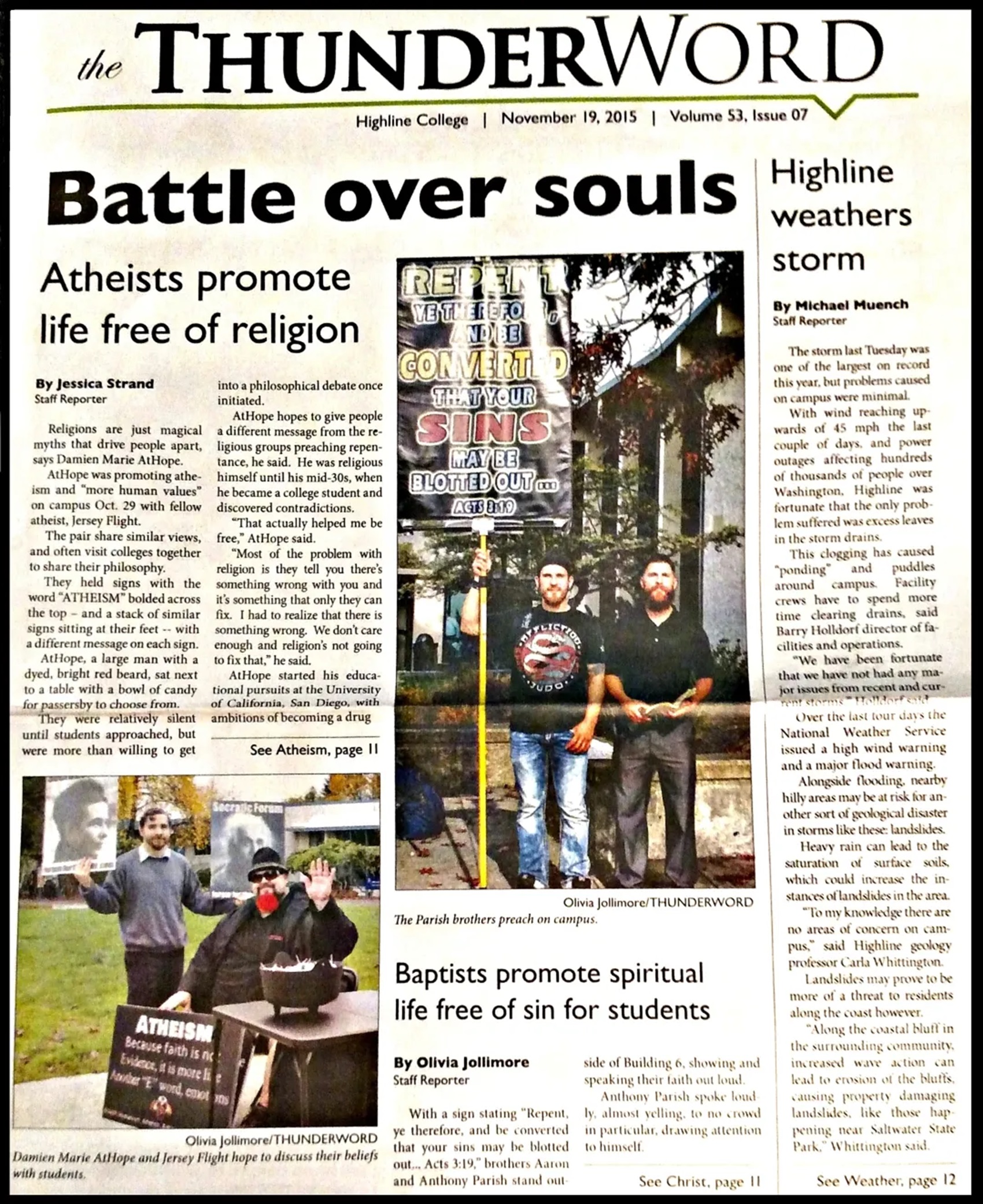

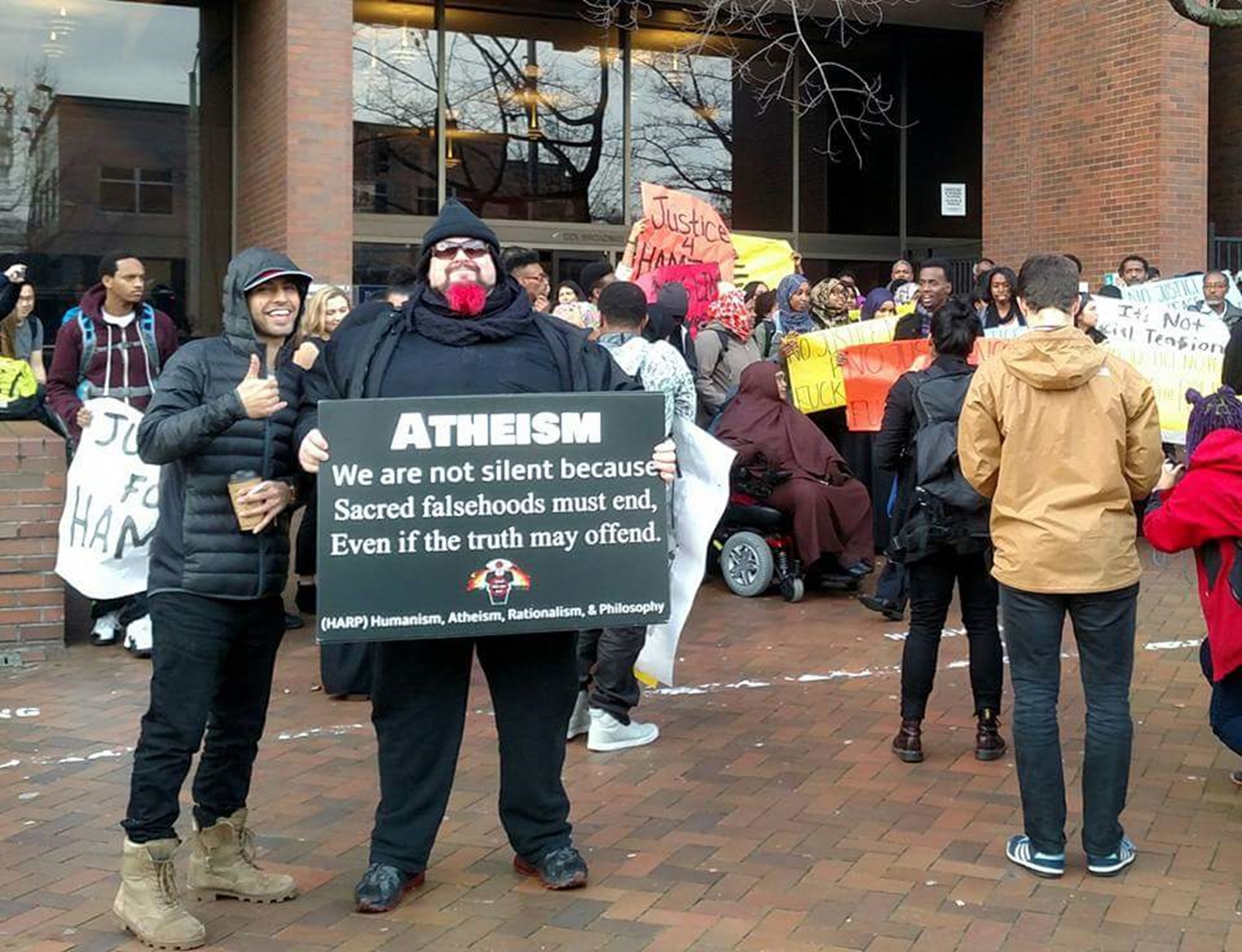
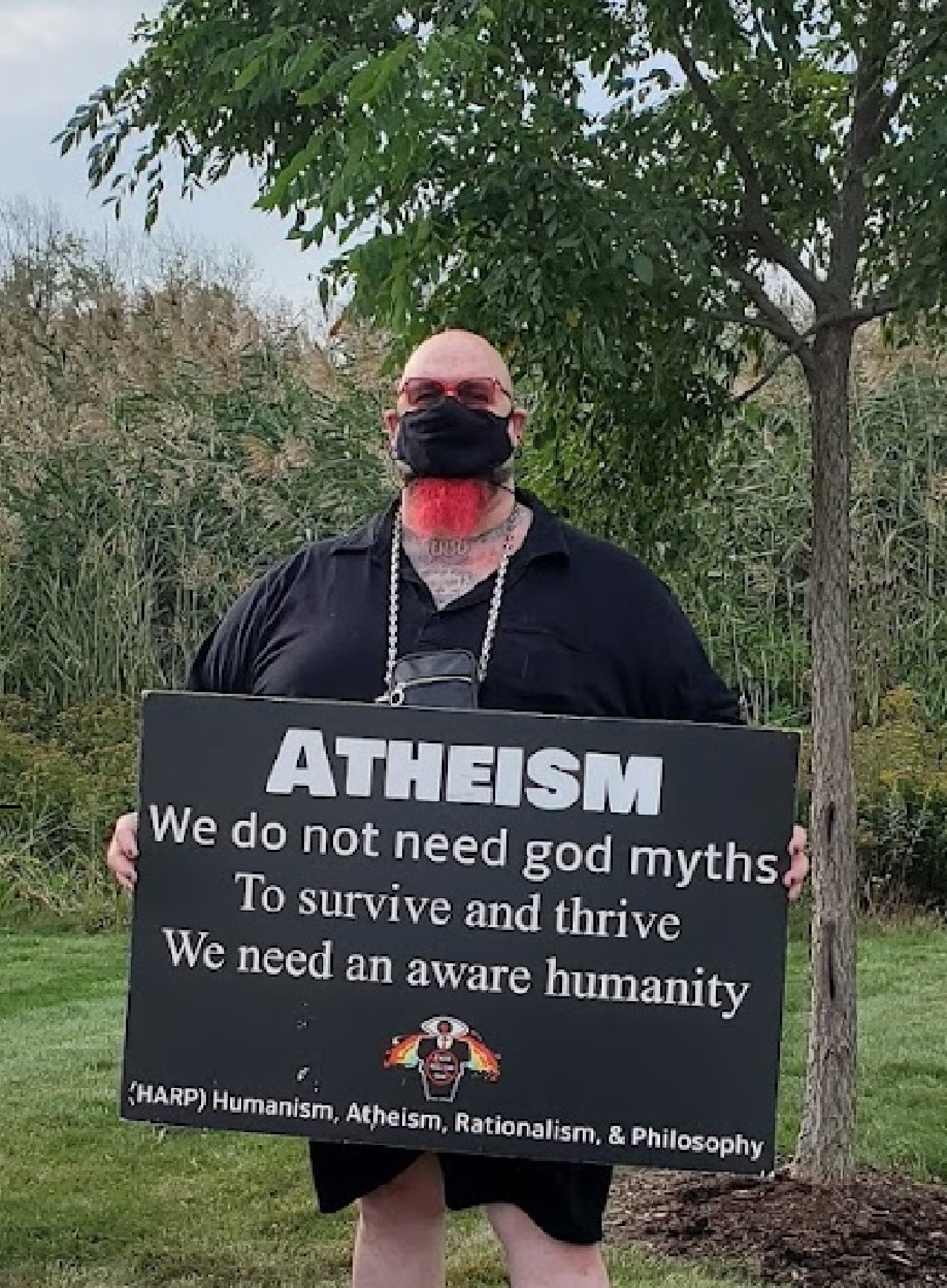

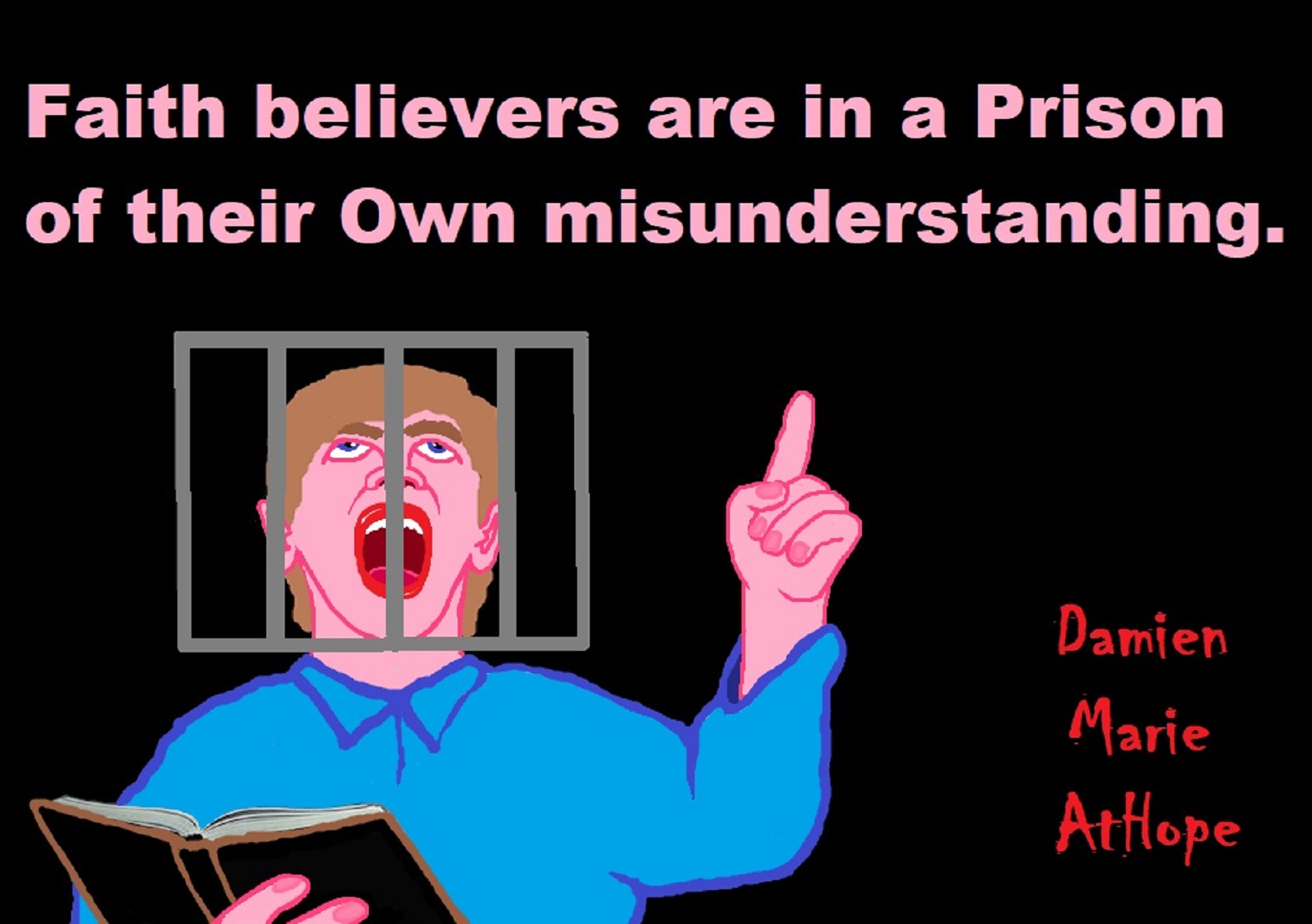
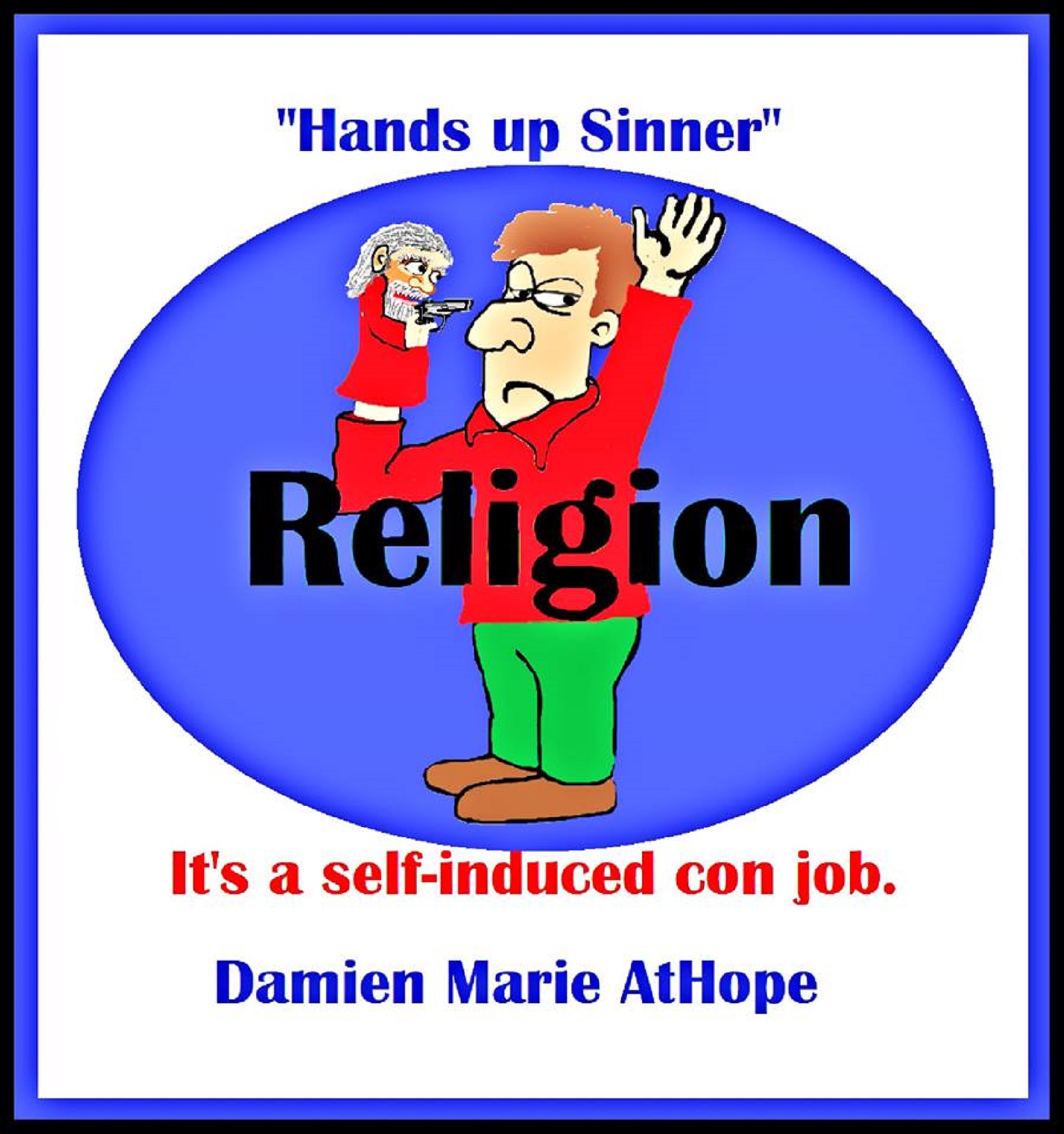


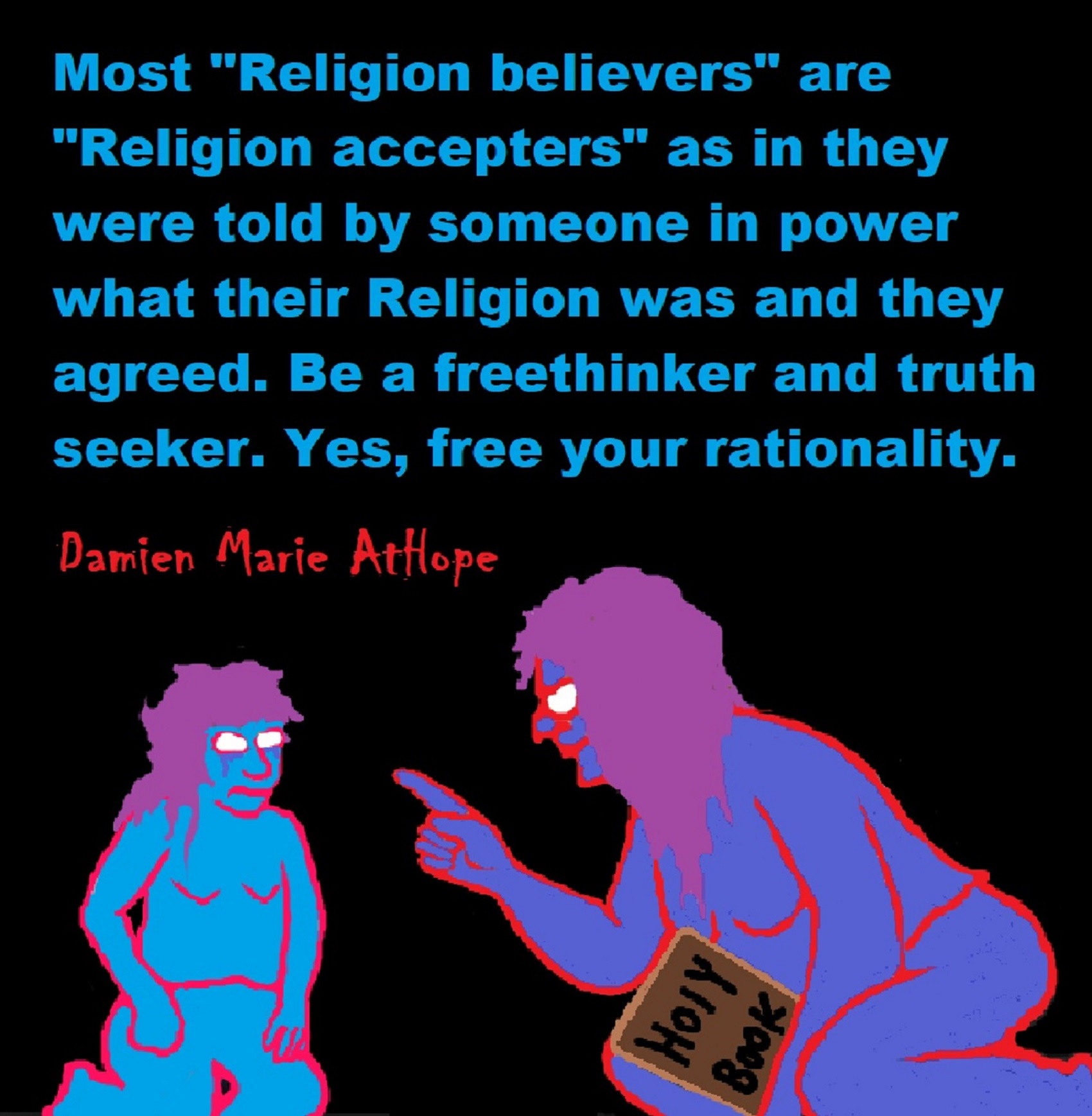
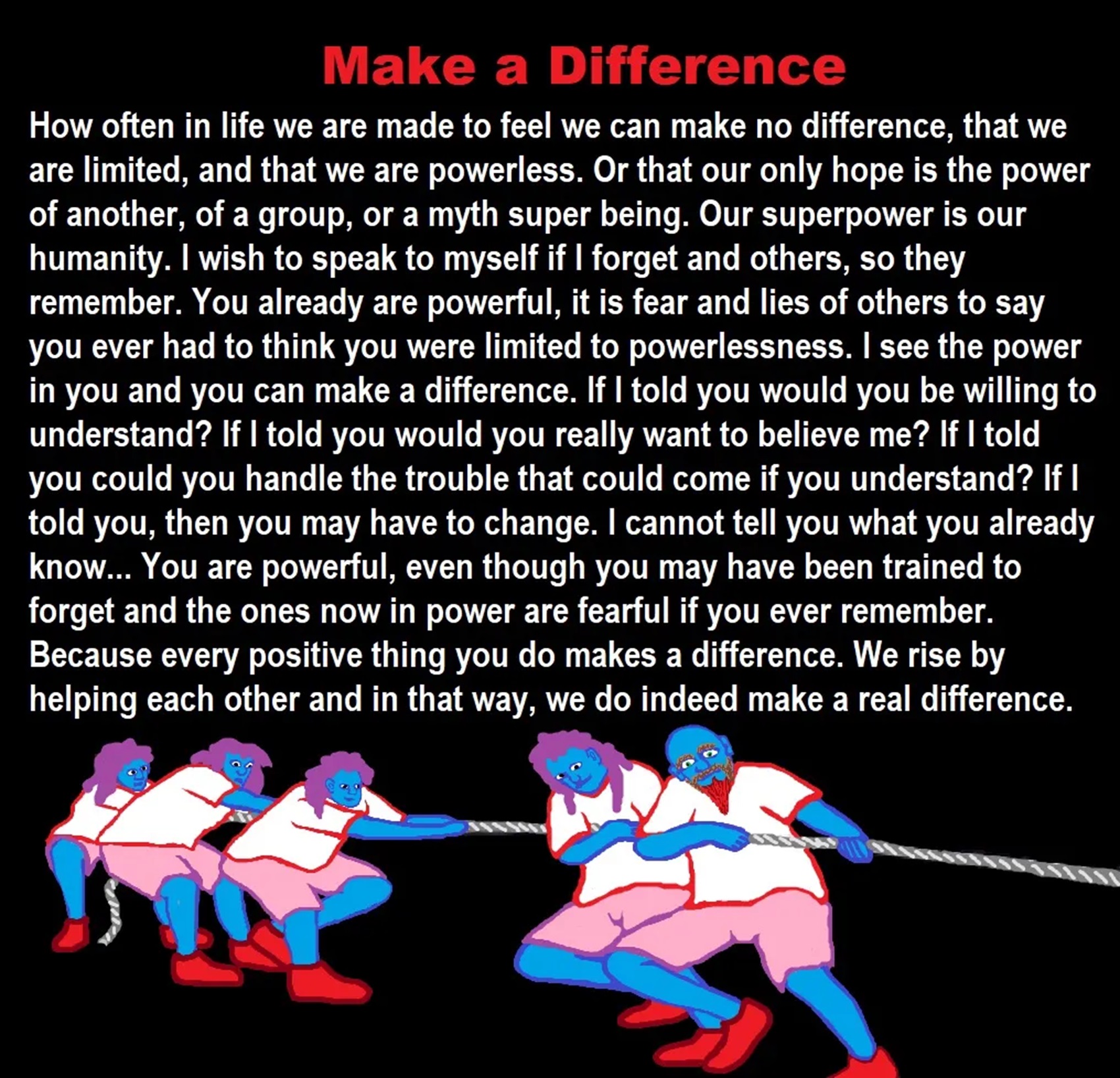
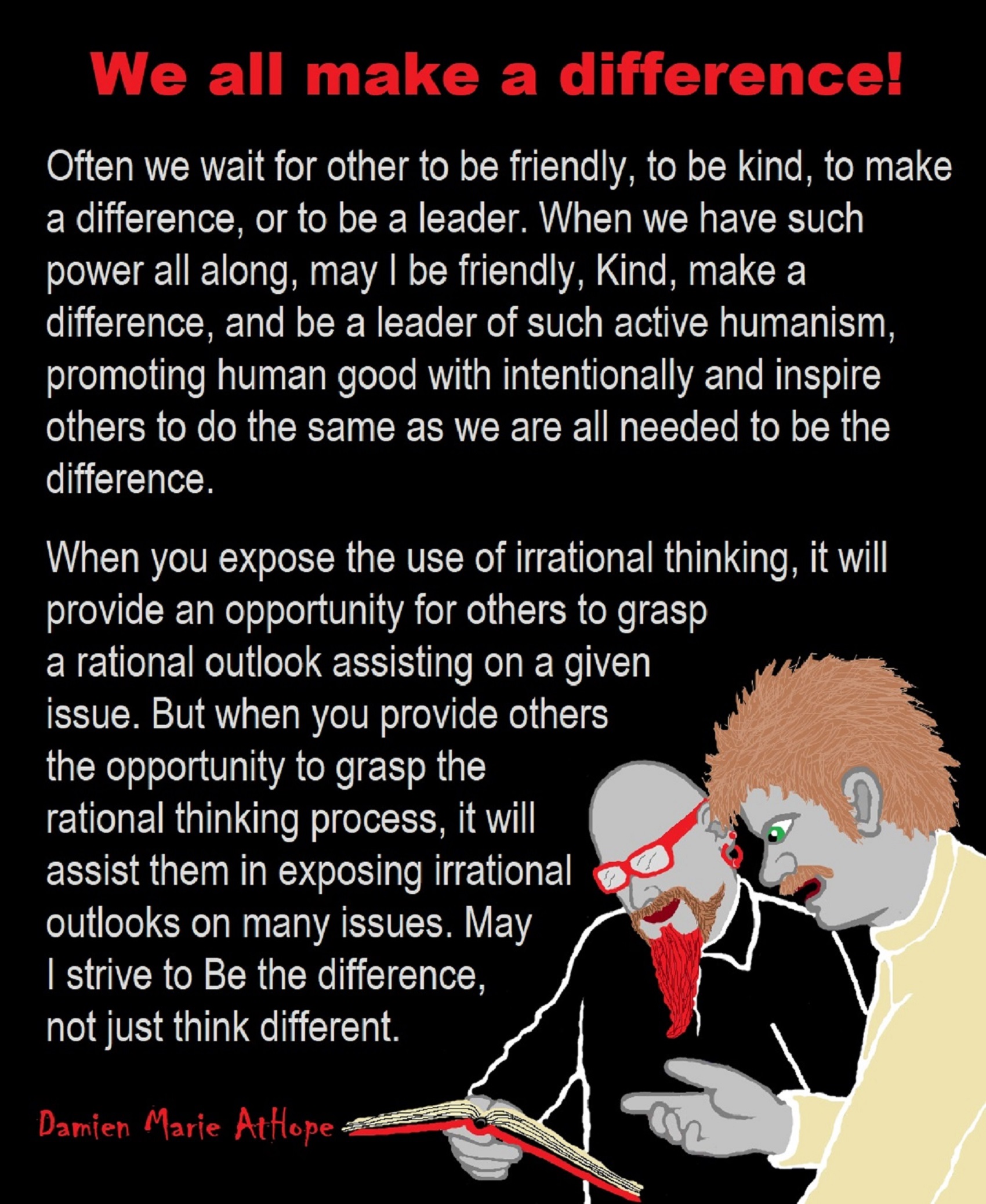
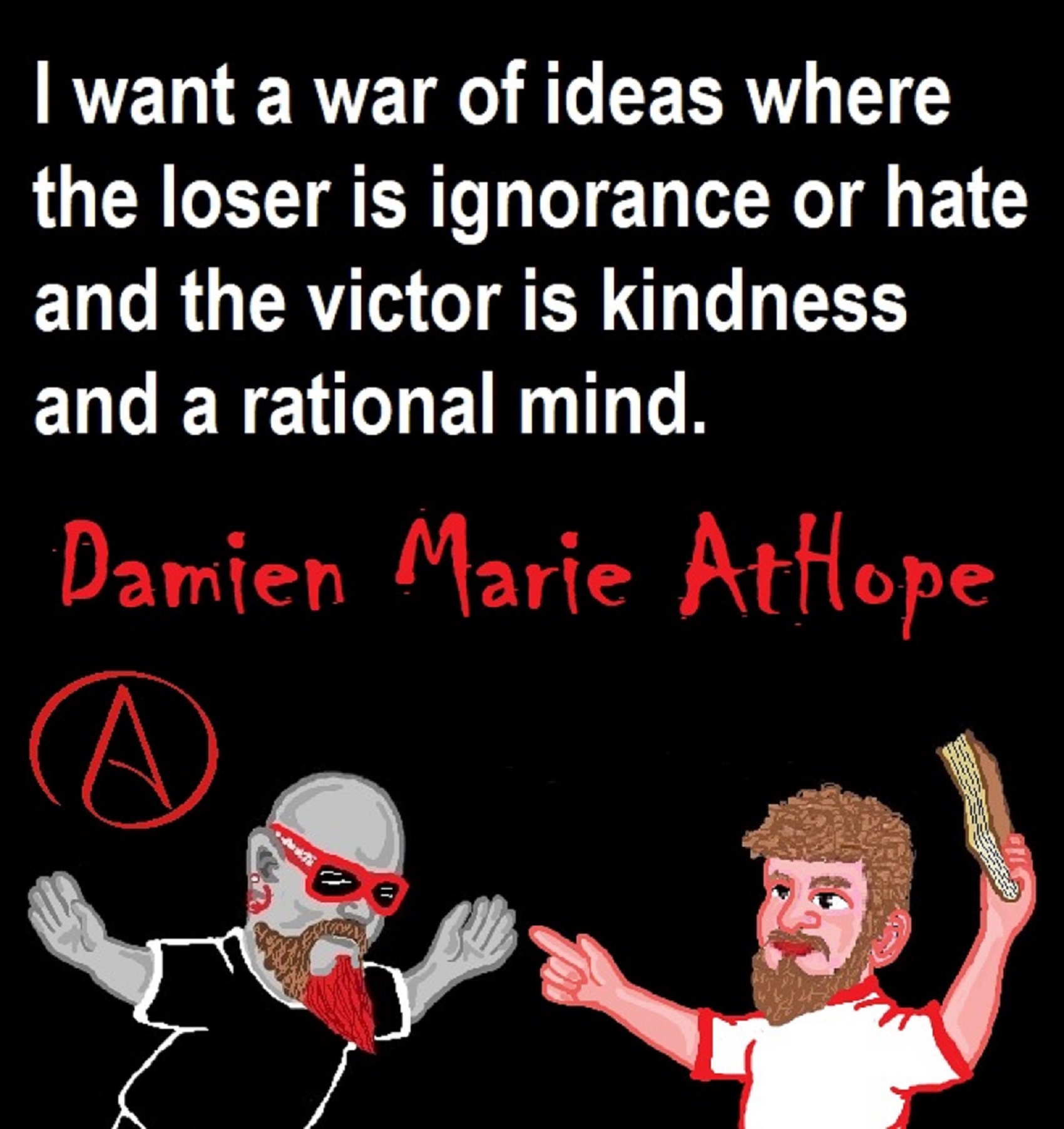
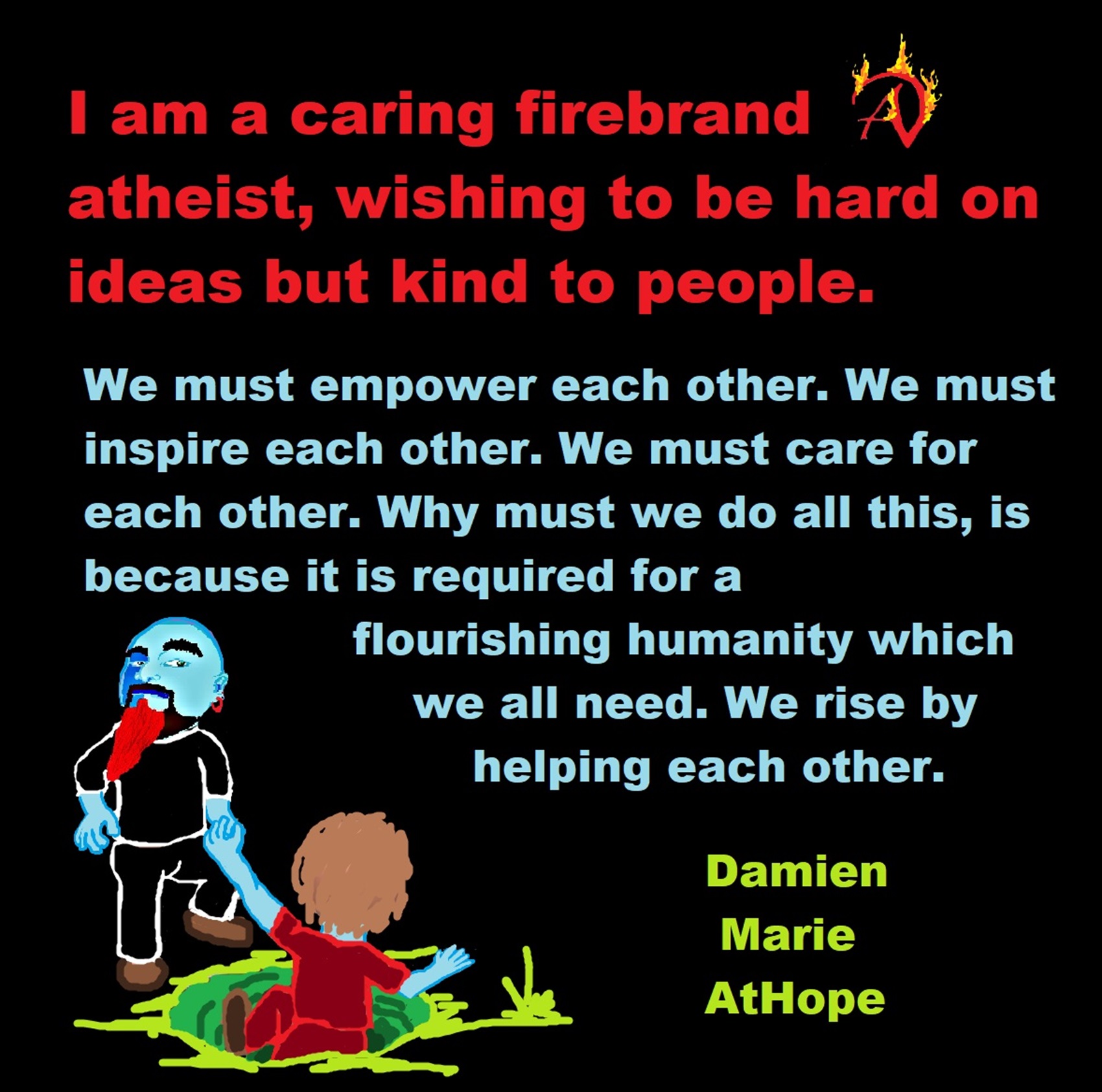

“Theists, there has to be a god, as something can not come from nothing.”
Well, thus something (unknown) happened and then there was something. This does not tell us what the something that may have been involved with something coming from nothing. A supposed first cause, thus something (unknown) happened and then there was something is not an open invitation to claim it as known, neither is it justified to call or label such an unknown as anything, especially an unsubstantiated magical thinking belief born of mythology and religious storytelling.

While hallucinogens are associated with shamanism, it is alcohol that is associated with paganism.
The Atheist-Humanist-Leftist Revolutionaries Shows in the prehistory series:
Show two: Pre-animism 300,000 years old and animism 100,000 years old: related to “Anarchism and Socialism”
Show tree: Totemism 50,000 years old: related to “Anarchism and Socialism”
Show four: Shamanism 30,000 years old: related to “Anarchism and Socialism”
Show five: Paganism 12,000 years old: related to “Anarchism and Socialism”
Show six: Emergence of hierarchy, sexism, slavery, and the new male god dominance: Paganism 7,000-5,000 years old: related to “Anarchism and Socialism” (Capitalism) (World War 0) Elite and their slaves!
Prehistory: related to “Anarchism and Socialism” the division of labor, power, rights, and recourses: VIDEO
Pre-animism 300,000 years old and animism 100,000 years old: related to “Anarchism and Socialism”: VIDEO
Totemism 50,000 years old: related to “Anarchism and Socialism”: VIDEO
Shamanism 30,000 years old: related to “Anarchism and Socialism”: VIDEO
Paganism 12,000 years old: related to “Anarchism and Socialism” (Pre-Capitalism): VIDEO
Paganism 7,000-5,000 years old: related to “Anarchism and Socialism” (Capitalism) (World War 0) Elite and their slaves: VIEDO
Paganism 5,000 years old: progressed organized religion and the state: related to “Anarchism and Socialism” (Kings and the Rise of the State): VIEDO
Paganism 4,000 years old: related to “Anarchism and Socialism” (First Moralistic gods, then the Origin time of Monotheism): VIEDO
I do not hate simply because I challenge and expose myths or lies any more than others being thought of as loving simply because of the protection and hiding from challenge their favored myths or lies.
The truth is best championed in the sunlight of challenge.
An archaeologist once said to me “Damien religion and culture are very different”
My response, So are you saying that was always that way, such as would you say Native Americans’ cultures are separate from their religions? And do you think it always was the way you believe?
I had said that religion was a cultural product. That is still how I see it and there are other archaeologists that think close to me as well. Gods too are the myths of cultures that did not understand science or the world around them, seeing magic/supernatural everywhere.
I personally think there is a goddess and not enough evidence to support a male god at Çatalhöyük but if there was both a male and female god and goddess then I know the kind of gods they were like Proto-Indo-European mythology.
This series idea was addressed in, Anarchist Teaching as Free Public Education or Free Education in the Public: VIDEO
Our 12 video series: Organized Oppression: Mesopotamian State Force and the Politics of power (9,000-4,000 years ago), is adapted from: The Complete and Concise History of the Sumerians and Early Bronze Age Mesopotamia (7000-2000 BC): https://www.youtube.com/watch?v=szFjxmY7jQA by “History with Cy“
Show #1: Mesopotamian State Force and the Politics of Power (Samarra, Halaf, Ubaid)
Show #2: Mesopotamian State Force and the Politics of Power
Show #3: Mesopotamian State Force and the Politics of Power (Uruk and the First Cities)
Show #4: Mesopotamian State Force and the Politics of Power (First Kings)
Show #5: Mesopotamian State Force and the Politics of Power (Early Dynastic Period)
Show #6: Mesopotamian State Force and the Politics of Power
Show #7: Mesopotamian State Force and the Politics of Power (Sargon and Akkadian Rule)
Show #9: Mesopotamian State Force and the Politics of Power (Gudea of Lagash and Utu-hegal)
Show #12: Mesopotamian State Force and the Politics of Power (Aftermath and Legacy of Sumer)

The “Atheist-Humanist-Leftist Revolutionaries”
Cory Johnston ☭ Ⓐ Atheist Leftist @Skepticallefty & I (Damien Marie AtHope) @AthopeMarie (my YouTube & related blog) are working jointly in atheist, antitheist, antireligionist, antifascist, anarchist, socialist, and humanist endeavors in our videos together, generally, every other Saturday.
Why Does Power Bring Responsibility?
Think, how often is it the powerless that start wars, oppress others, or commit genocide? So, I guess the question is to us all, to ask, how can power not carry responsibility in a humanity concept? I know I see the deep ethical responsibility that if there is power their must be a humanistic responsibility of ethical and empathic stewardship of that power. Will I be brave enough to be kind? Will I possess enough courage to be compassionate? Will my valor reach its height of empathy? I as everyone, earns our justified respect by our actions, that are good, ethical, just, protecting, and kind. Do I have enough self-respect to put my love for humanity’s flushing, over being brought down by some of its bad actors? May we all be the ones doing good actions in the world, to help human flourishing.
I create the world I want to live in, striving for flourishing. Which is not a place but a positive potential involvement and promotion; a life of humanist goal precision. To master oneself, also means mastering positive prosocial behaviors needed for human flourishing. I may have lost a god myth as an atheist, but I am happy to tell you, my friend, it is exactly because of that, leaving the mental terrorizer, god belief, that I truly regained my connected ethical as well as kind humanity.
Cory and I will talk about prehistory and theism, addressing the relevance to atheism, anarchism, and socialism.
At the same time as the rise of the male god, 7,000 years ago, there was also the very time there was the rise of violence, war, and clans to kingdoms, then empires, then states. It is all connected back to 7,000 years ago, and it moved across the world.
Cory Johnston: https://damienmarieathope.com/2021/04/cory-johnston-mind-of-a-skeptical-leftist/?v=32aec8db952d
The Mind of a Skeptical Leftist (YouTube)
Cory Johnston: Mind of a Skeptical Leftist @Skepticallefty
The Mind of a Skeptical Leftist By Cory Johnston: “Promoting critical thinking, social justice, and left-wing politics by covering current events and talking to a variety of people. Cory Johnston has been thoughtfully talking to people and attempting to promote critical thinking, social justice, and left-wing politics.” http://anchor.fm/skepticalleft
Cory needs our support. We rise by helping each other.
Cory Johnston ☭ Ⓐ @Skepticallefty Evidence-based atheist leftist (he/him) Producer, host, and co-host of 4 podcasts @skeptarchy @skpoliticspod and @AthopeMarie
Damien Marie AtHope (“At Hope”) Axiological Atheist, Anti-theist, Anti-religionist, Secular Humanist. Rationalist, Writer, Artist, Poet, Philosopher, Advocate, Activist, Psychology, and Armchair Archaeology/Anthropology/Historian.
Damien is interested in: Freedom, Liberty, Justice, Equality, Ethics, Humanism, Science, Atheism, Antiteism, Antireligionism, Ignosticism, Left-Libertarianism, Anarchism, Socialism, Mutualism, Axiology, Metaphysics, LGBTQI, Philosophy, Advocacy, Activism, Mental Health, Psychology, Archaeology, Social Work, Sexual Rights, Marriage Rights, Woman’s Rights, Gender Rights, Child Rights, Secular Rights, Race Equality, Ageism/Disability Equality, Etc. And a far-leftist, “Anarcho-Humanist.”
I am not a good fit in the atheist movement that is mostly pro-capitalist, I am anti-capitalist. Mostly pro-skeptic, I am a rationalist not valuing skepticism. Mostly pro-agnostic, I am anti-agnostic. Mostly limited to anti-Abrahamic religions, I am an anti-religionist.
To me, the “male god” seems to have either emerged or become prominent around 7,000 years ago, whereas the now favored monotheism “male god” is more like 4,000 years ago or so. To me, the “female goddess” seems to have either emerged or become prominent around 11,000-10,000 years ago or so, losing the majority of its once prominence around 2,000 years ago due largely to the now favored monotheism “male god” that grow in prominence after 4,000 years ago or so.
My Thought on the Evolution of Gods?
Animal protector deities from old totems/spirit animal beliefs come first to me, 13,000/12,000 years ago, then women as deities 11,000/10,000 years ago, then male gods around 7,000/8,000 years ago. Moralistic gods around 5,000/4,000 years ago, and monotheistic gods around 4,000/3,000 years ago.
To me, animal gods were likely first related to totemism animals around 13,000 to 12,000 years ago or older. Female as goddesses was next to me, 11,000 to 10,000 years ago or so with the emergence of agriculture. Then male gods come about 8,000 to 7,000 years ago with clan wars. Many monotheism-themed religions started in henotheism, emerging out of polytheism/paganism.

Damien Marie AtHope (Said as “At” “Hope”)/(Autodidact Polymath but not good at math):
Axiological Atheist, Anti-theist, Anti-religionist, Secular Humanist, Rationalist, Writer, Artist, Jeweler, Poet, “autodidact” Philosopher, schooled in Psychology, and “autodidact” Armchair Archaeology/Anthropology/Pre-Historian (Knowledgeable in the range of: 1 million to 5,000/4,000 years ago). I am an anarchist socialist politically. Reasons for or Types of Atheism
My Website, My Blog, & Short-writing or Quotes, My YouTube, Twitter: @AthopeMarie, and My Email: damien.marie.athope@gmail.com

